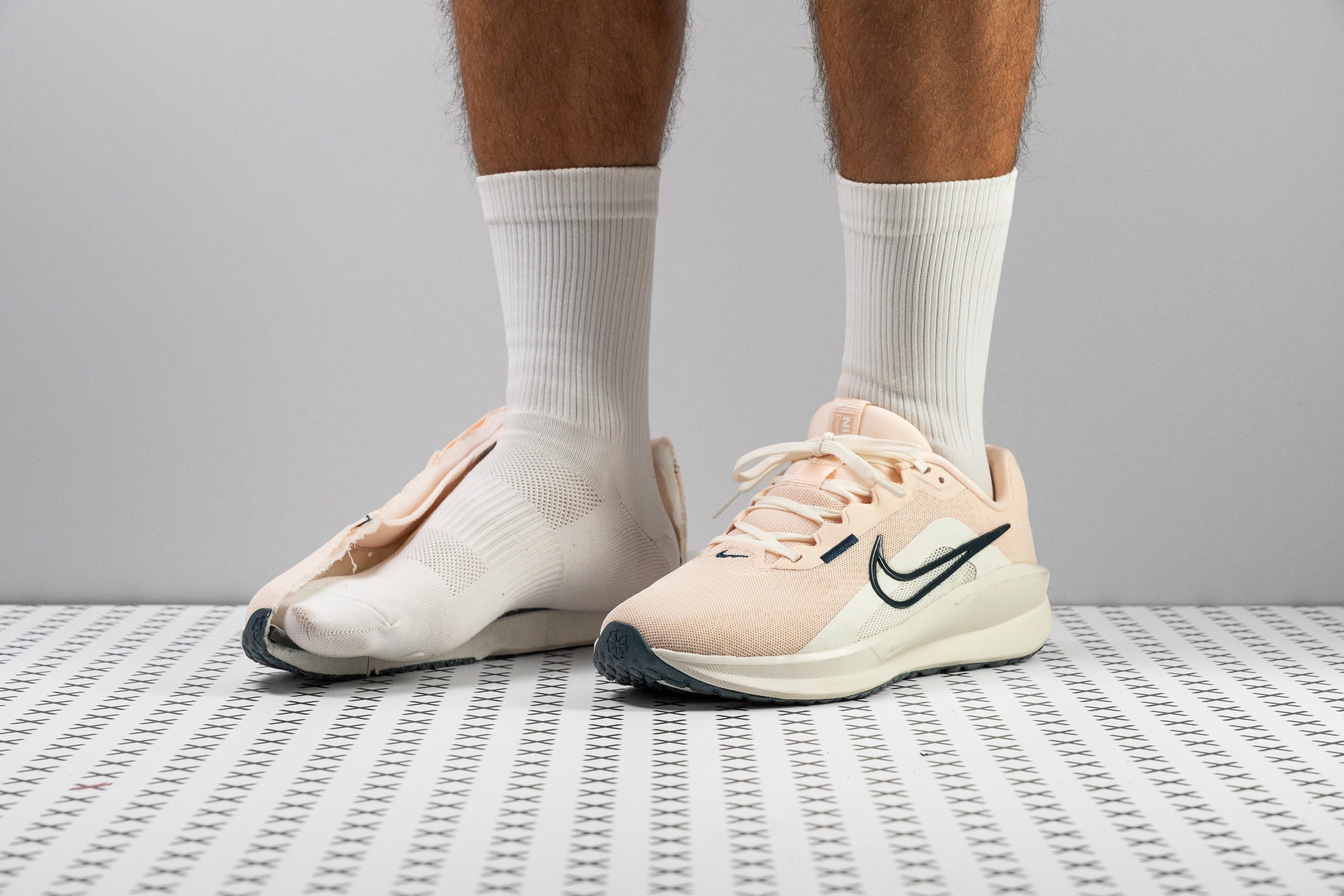Our verdict
- Top pick in best cheap running shoes (2024)
Pros
- Improved breathability
- Good durability
- Easy on the wallet
- Ideal for heel strikers
- Doubles as a walking shoe
- Weight reduction from v1
- Sustainable design
- Improved materials
Cons
- Limited energy return
- Forefoot stack is a bit low
- Grip could be better
Audience verdict
- Top 15% most popular running shoes
Comparison
The most similar running shoes compared
+ + Add a shoe | |||||
|---|---|---|---|---|---|
| Audience score | 77 Decent! | 79 Good! | 80 Good! | 85 Good! | |
| Price | $75 | $70 | $90 | $65 | |
| Pace | Daily running | Daily running | Daily running | Daily running | |
| Shock absorption | Moderate | Moderate | Low | Moderate | |
| Energy return | Low | Low | Low | Low | |
| Traction | Moderate | Moderate | Moderate | Low | |
| Arch support | Neutral | Neutral | Neutral | Neutral | |
| Weight lab Weight brand | 9.3 oz / 265g 9.4 oz / 267g | 9.7 oz / 275g 9.7 oz / 275g | 10.5 oz / 298g 10.8 oz / 305g | 9.7 oz / 275g 10.7 oz / 303g | |
| Drop lab Drop brand | 10.1 mm 10.0 mm | 7.8 mm 8.0 mm | 8.6 mm 10.0 mm | 9.4 mm 10.0 mm | |
| Strike pattern | Heel | Mid/forefoot | HeelMid/forefoot | HeelMid/forefoot | |
| Size | Slightly small | True to size | True to size | True to size | |
| Midsole softness | Balanced | Balanced | Balanced | Balanced | |
| Difference in midsole softness in cold | Small | Small | Big | Small | |
| Toebox durability | Decent | Bad | Decent | Bad | |
| Heel padding durability | Good | Good | Decent | Bad | |
| Outsole durability | Good | Decent | Decent | Decent | |
| Breathability | Moderate | Moderate | Moderate | Moderate | |
| Width / fit | Medium | Medium | Medium | Wide | |
| Toebox width | Medium | Medium | Narrow | Medium | |
| Stiffness | Moderate | Moderate | Moderate | Moderate | |
| Torsional rigidity | Moderate | Moderate | Stiff | Flexible | |
| Heel counter stiffness | Moderate | Stiff | Stiff | Moderate | |
| Heel lab Heel brand | 32.2 mm 32.0 mm | 31.2 mm 31.0 mm | 33.0 mm 34.0 mm | 31.2 mm 33.0 mm | |
| Forefoot lab Forefoot brand | 22.1 mm 22.0 mm | 23.4 mm 23.0 mm | 24.4 mm 24.0 mm | 21.8 mm 23.0 mm | |
| Widths available | NarrowNormalWideX-Wide | NormalWideX-Wide | Normal | NormalWide | |
| Orthotic friendly | ✓ | ✓ | ✓ | ✓ | |
| Season | All seasons | All seasons | All seasons | All seasons | |
| Removable insole | ✓ | ✓ | ✓ | ✓ | |
| Ranking | #351 Bottom 8% | #339 Bottom 11% | #316 Bottom 17% | #206 Bottom 46% | |
| Popularity | #57 Top 15% | #70 Top 19% | #107 Top 28% | #113 Top 30% |
Who should buy
We think the Nike Downshifter 13 is a great option for:
- Runners who want the feel of a Nike Pegasus without the higher price—this budget-friendly model offers a similar fit and dimensions.
- Those seeking a reliable, durable, and affordable daily trainer for regular use.
- Beginners in search of a neutral running shoe versatile enough for running and daily activities.
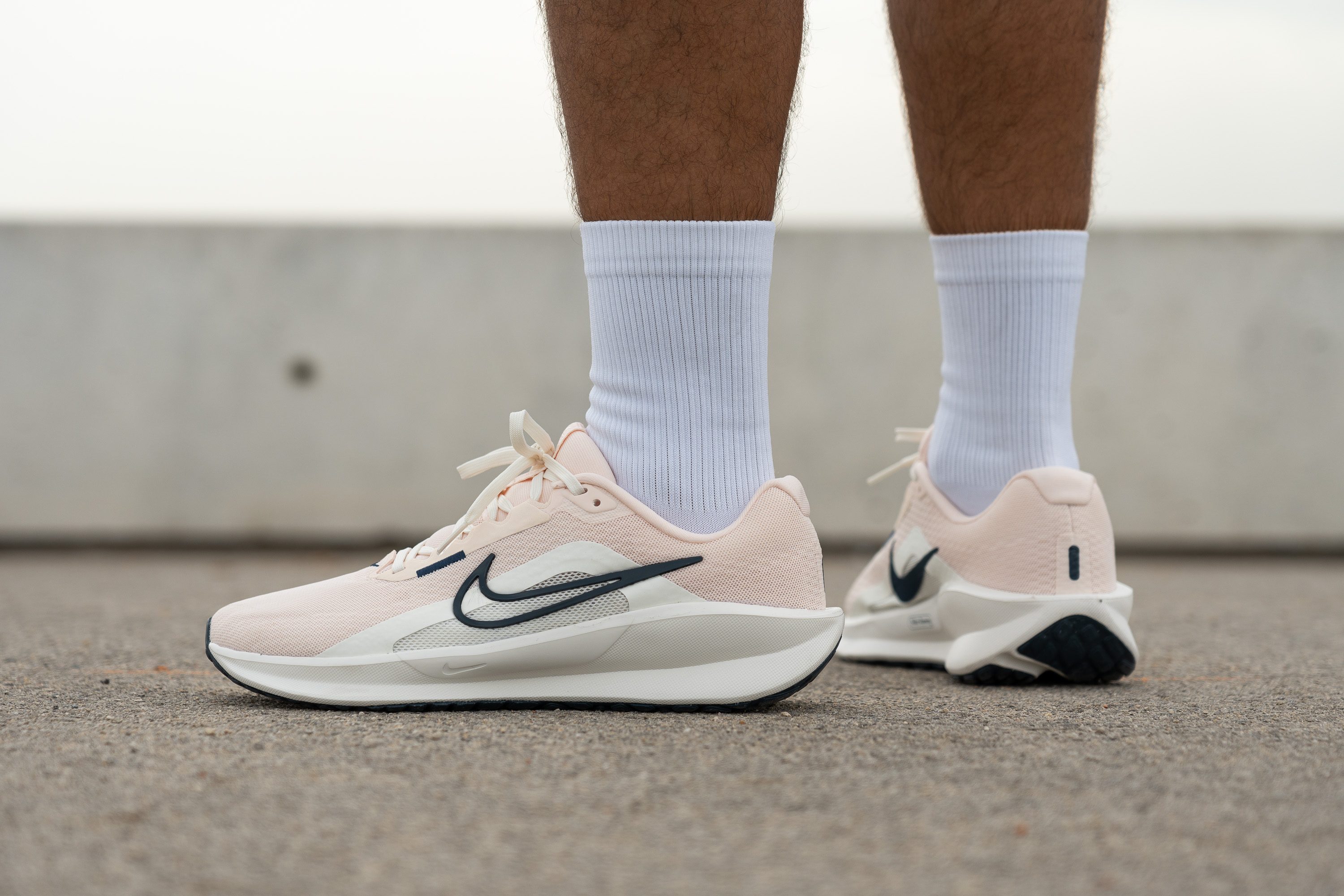
Who should NOT buy
We believe that the Nike Downshifter 13, while improved in terms of weight, still falls short of being classified as a lightweight running shoe. For those who prioritize this feature, we suggest looking at the ASICS Gel Pulse 15, which also offers superior energy return.
Additionally, we think the forefoot stack on the Downshifter 13 is a bit too low for long-distance runs or for those with a forefoot strike. If that’s your case, the Saucony Axon 3 is a much better, albeit slightly pricier, alternative.
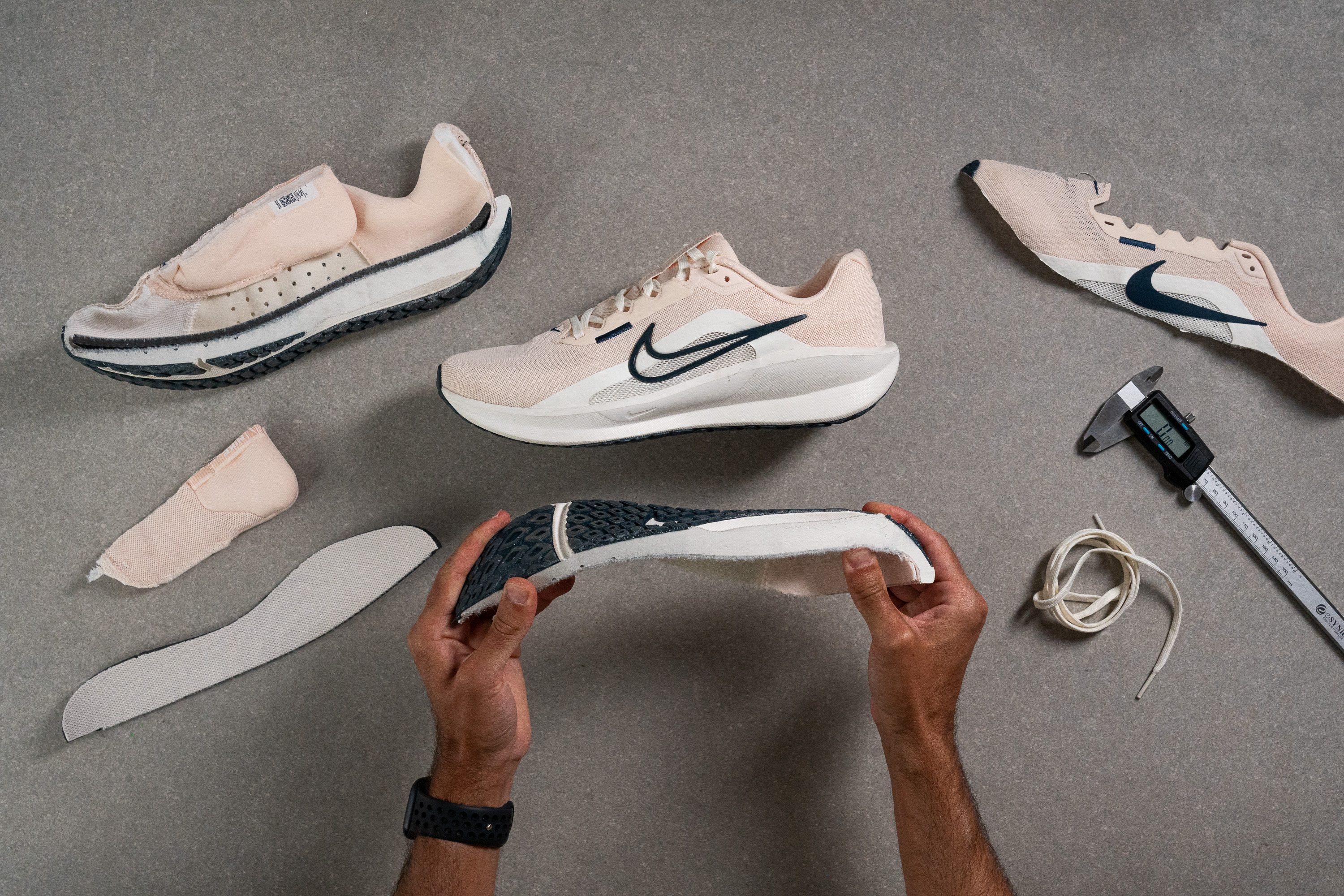
Cushioning
Shock absorption
The Downshifter 13 updated its design to resemble the Vomero series, giving the illusion of extra cushioning in the heel, where bulky sidewalls create a near-maximalist look.
In reality, it only scores 111 SA in the back and just 84 SA in the forefoot, matching its low-cushioned predecessor.
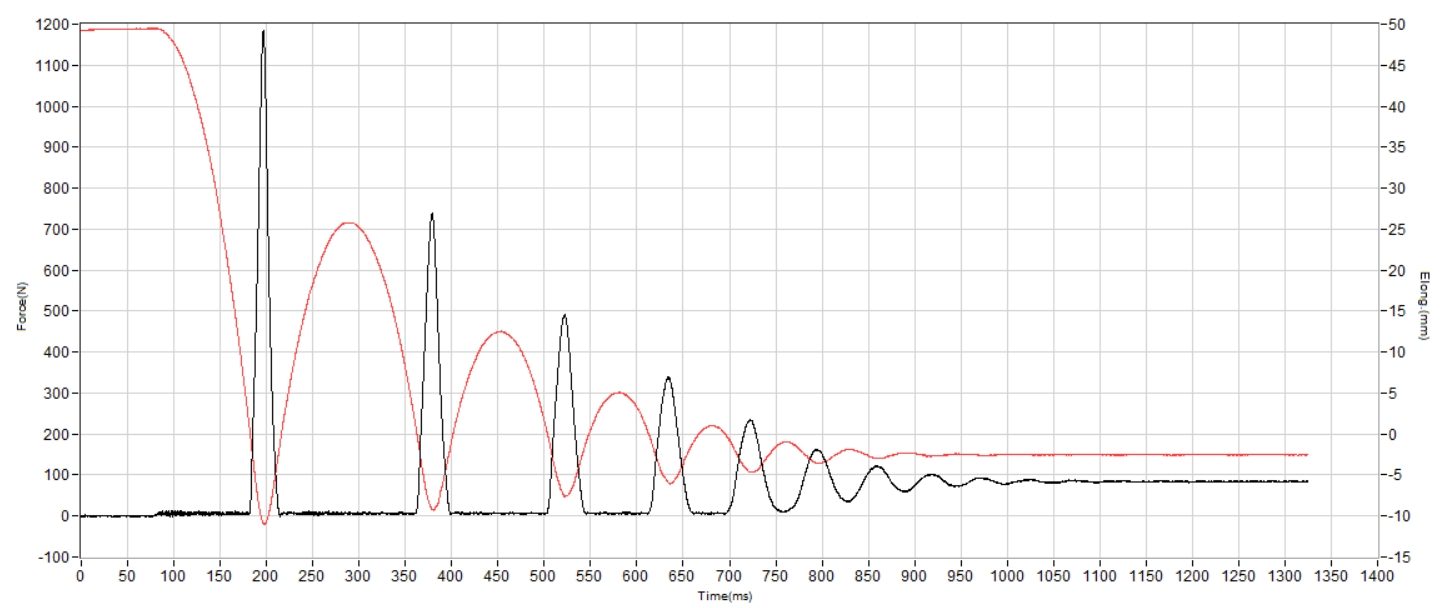
| Downshifter 13 | 111 SA |
| Average | 130 SA |
Energy return
Being an affordable running shoe, expectations weren’t high in the lab when it came to bounce—especially after our runs, where it felt just fine. Our machine confirmed that, measuring 54.0% in the heel and 57.7% in the forefoot.
| Downshifter 13 | 54.0% |
| Average | 58.6% |
Heel stack
We've noted that the reduced weight of the Downshifter 13 does not result from diminished cushioning—in fact, quite the opposite. The shoe has increased slightly in heel height, topping out at 32.2 mm.
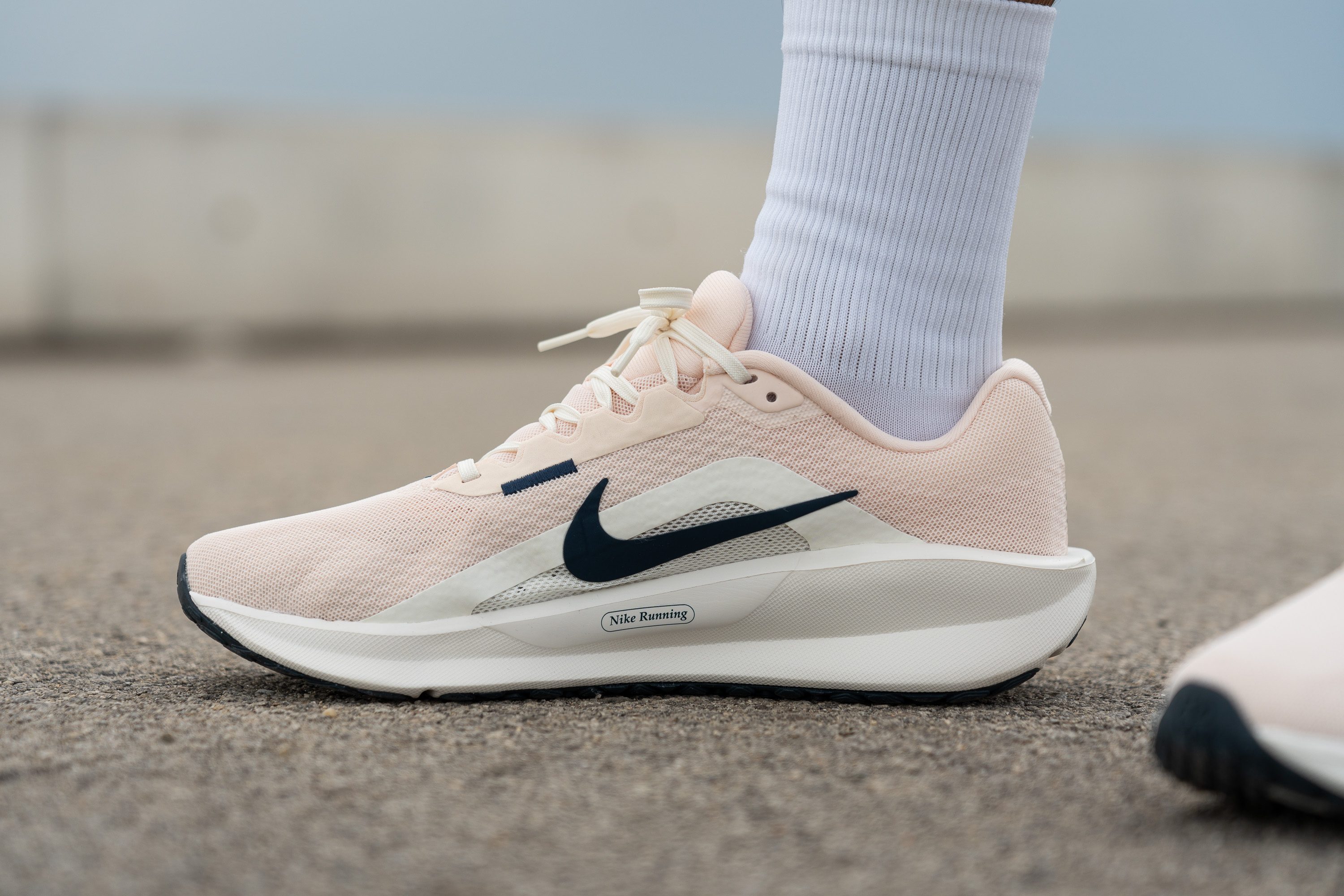
While this is certainly not in the realm of maximalist running shoes, it fits perfectly with its role as a daily trainer. We found that a 32.2-mm heel offers the right blend of versatility and support. Any taller would have been excessive and likely added unnecessary weight.
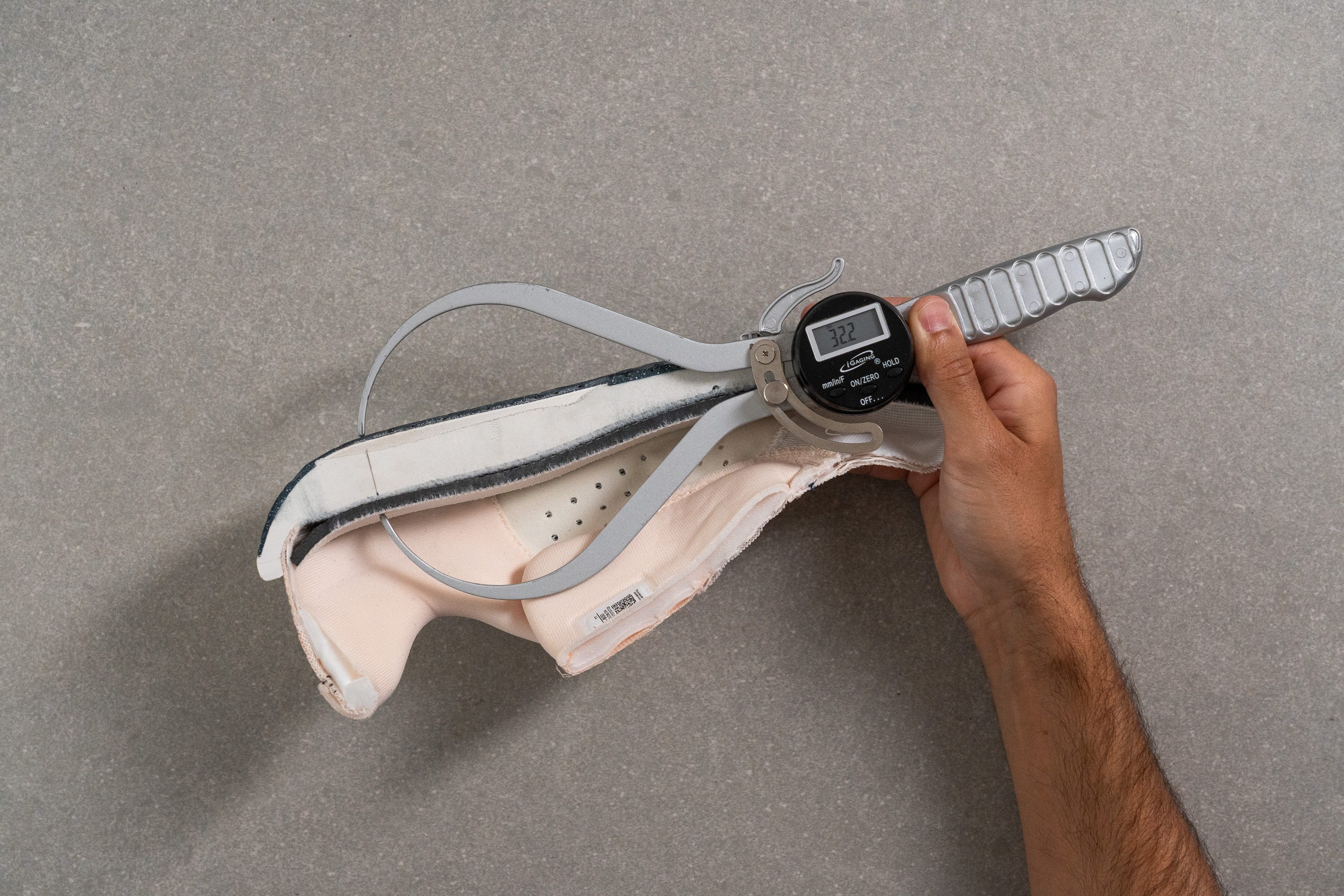
| Downshifter 13 | 32.2 mm |
| Average | 34.8 mm |
Forefoot stack
The forefoot, at just 22.1 mm, is somewhat thin, making it challenging to fully recommend this shoe for midfoot and forefoot strikers, particularly those with heavier builds or those planning to cover long runs.
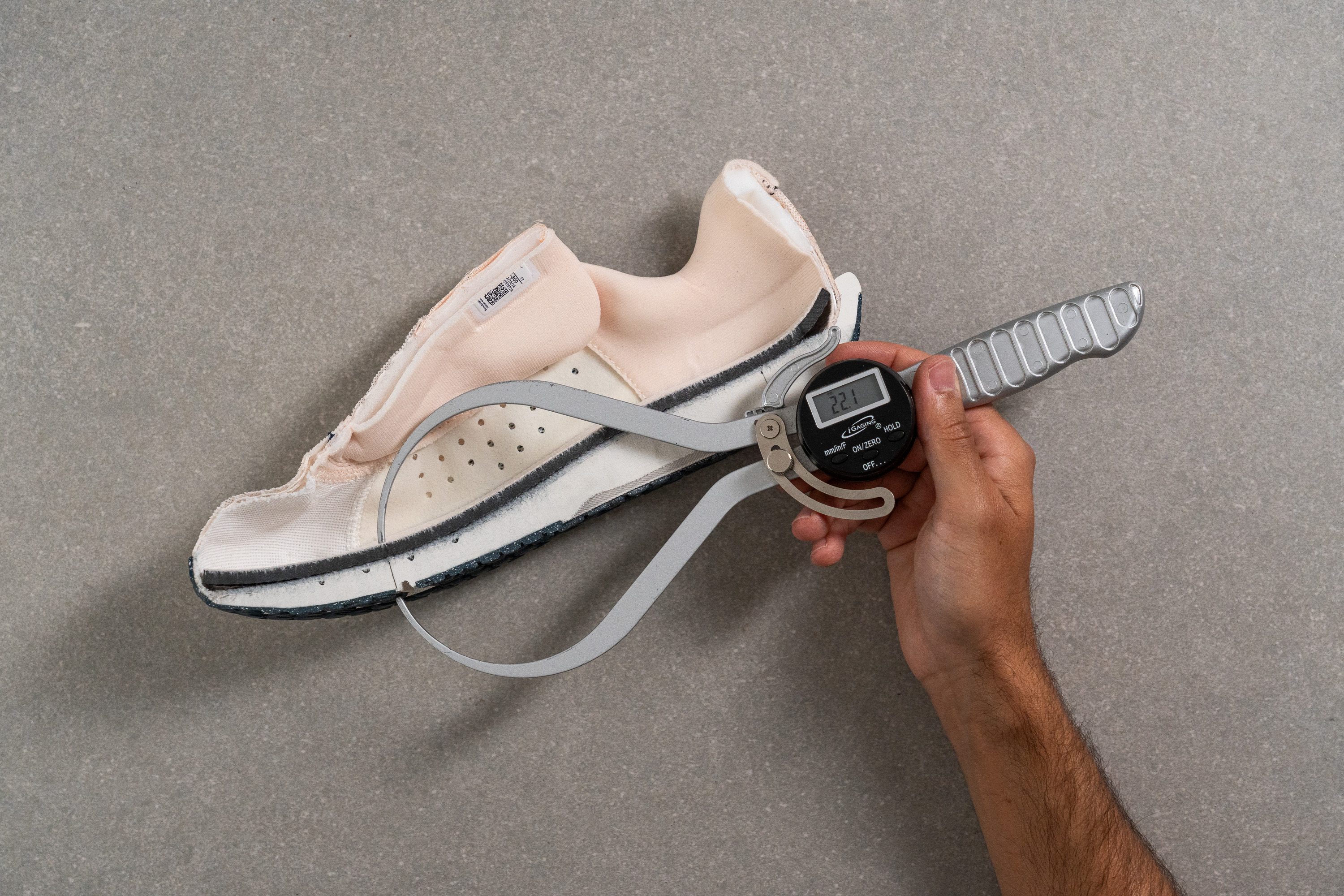
| Downshifter 13 | 22.1 mm |
| Average | 26.2 mm |
Drop
Nike advertises a 10-mm drop for this shoe, and our lab tests have verified this claim.
This level of accuracy is exceptional for a budget-friendly shoe like the Downshifter. Our precise measurements showed only a tiny discrepancy, revealing an actual drop of 10.1 mm.
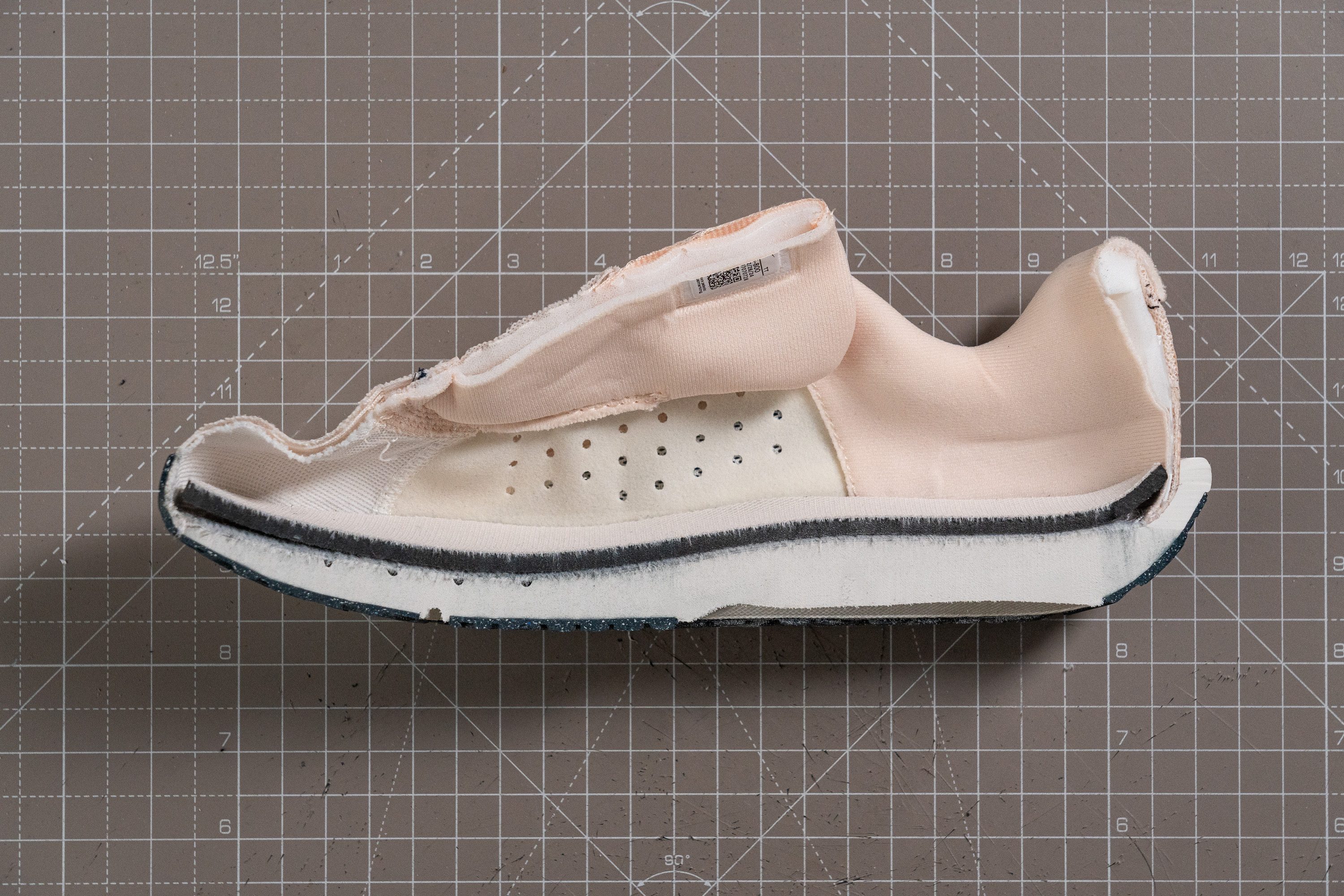
| Downshifter 13 | 10.1 mm |
| Average | 8.6 mm |
Midsole softness
Given its affordable price, we anticipated a standard EVA midsole, and indeed, that's what we found. Nike has continued to use the same Phylon foam found in their budget-friendly shoes, which we measured at 21.3 HA on our durometer—not too soft, yet not too firm either.
This foam is quite suitable for the price, but it doesn’t offer exceptional energy return. However, for casual runners and those less focused on performance, we think it's just fine!
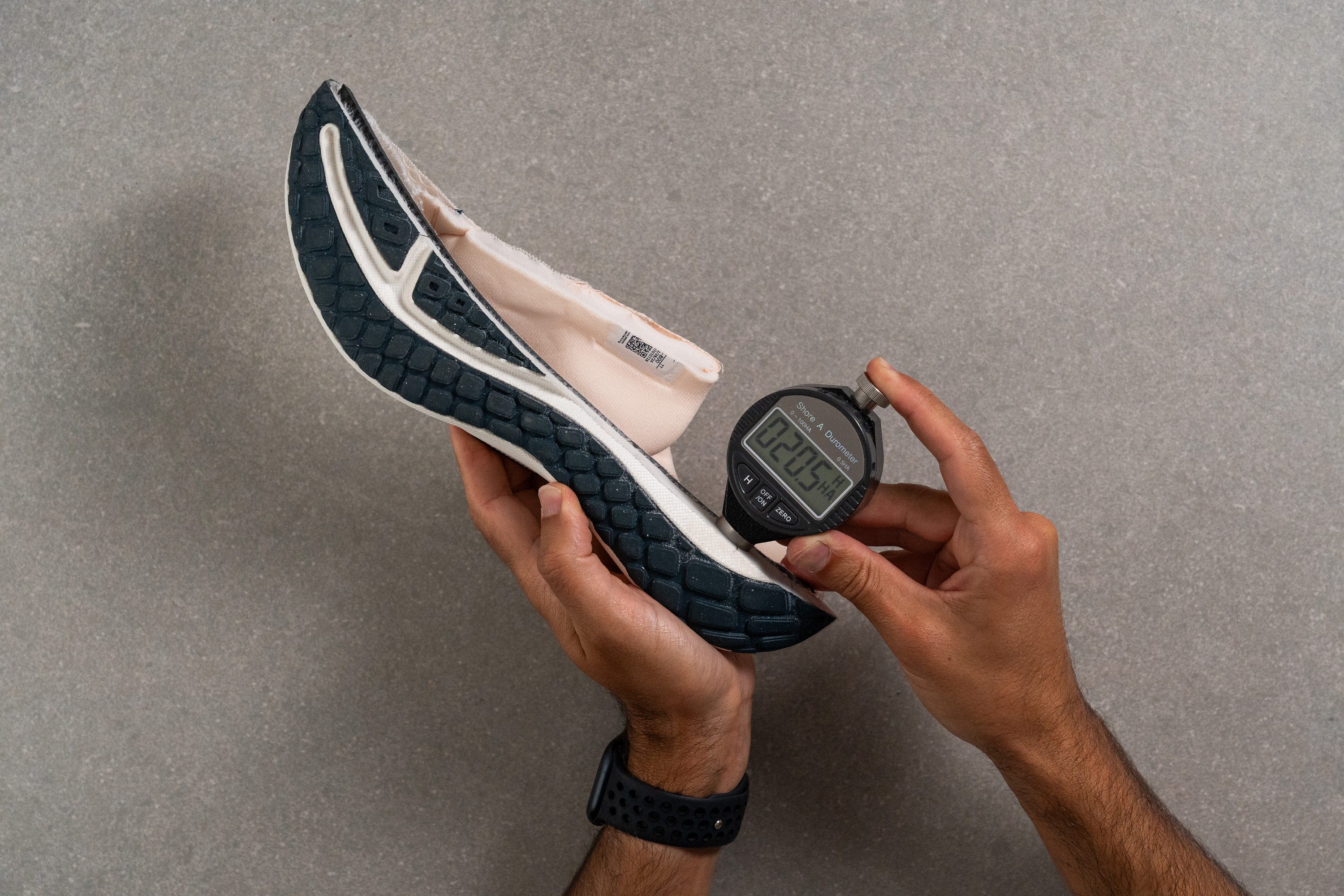
| Downshifter 13 | 21.3 HA |
| Average | 20.4 HA |
Rocker
The Downshifter 13 is a classic running shoe that features a pronounced heel bevel to assist rearfoot strikers with smoother transitions. We also found that while the sole curvature is most evident in the heel, but there's also a slight curve in the forefoot to aid toe-off.
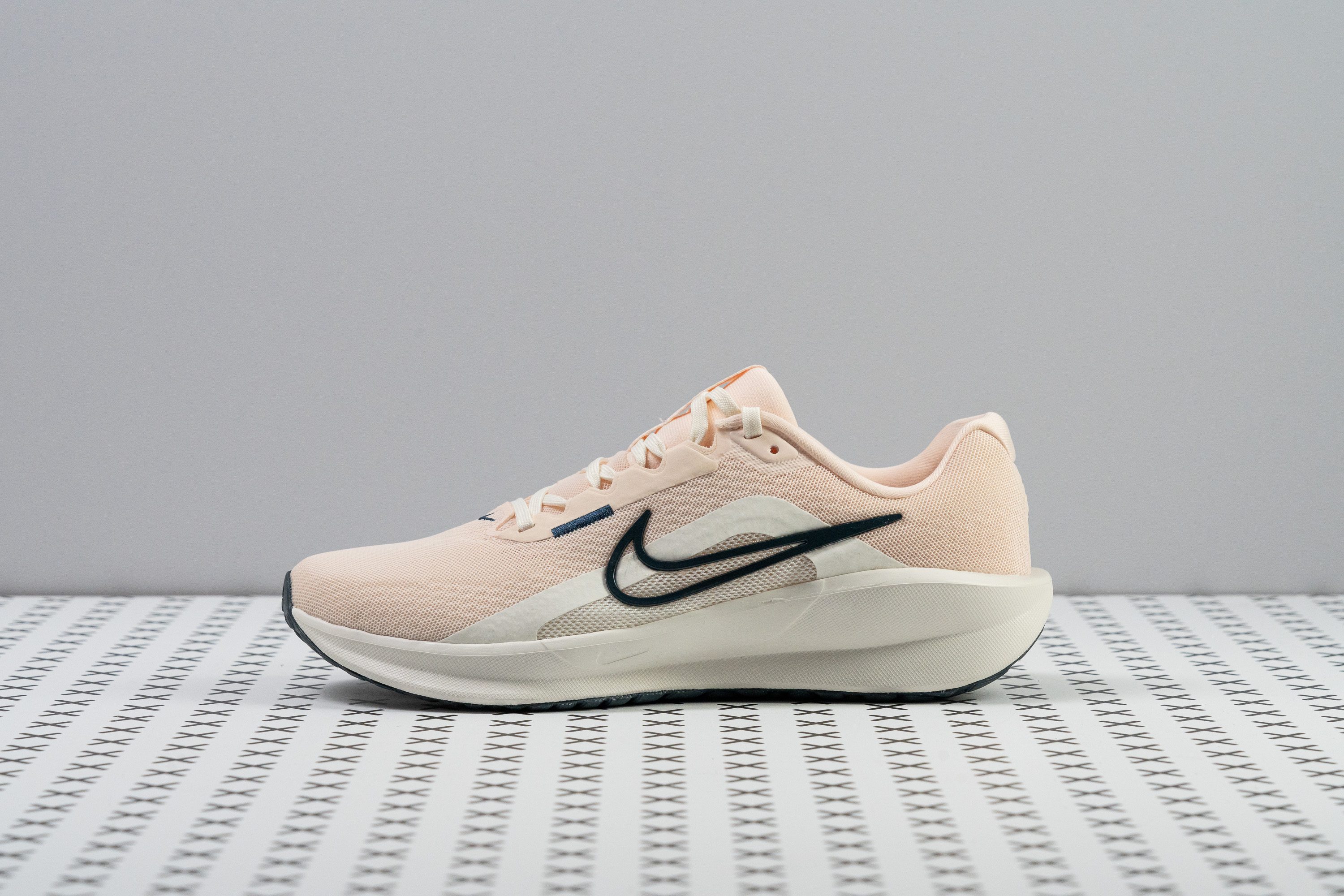
However, the shoe maintains a mostly flat geometry, which we believe is ideal for a daily trainer. In our view, this design ensures flexibility and comfort, making it feel great not just for running but also for walking.
Size and fit
Size
Nike Downshifter 13 fits slightly small (121 votes).
Internal length
| Downshifter 13 | 270.5 mm |
| Average | 269.4 mm |
Width / Fit
Next, we measured the width and found 95.1 mm at the widest point. Nike clearly designed the Downshifter 13 to accommodate as many runners as possible, as it's an average design.
For those with wider feet who may find this measurement a bit narrow, there are two options: opt for a wide size (2E and 4E, available in select markets) or consider shoes from rival brands like Adidas, which offer a broader fit in budget-friendly models like the Duramo Speed or Supernova 3.
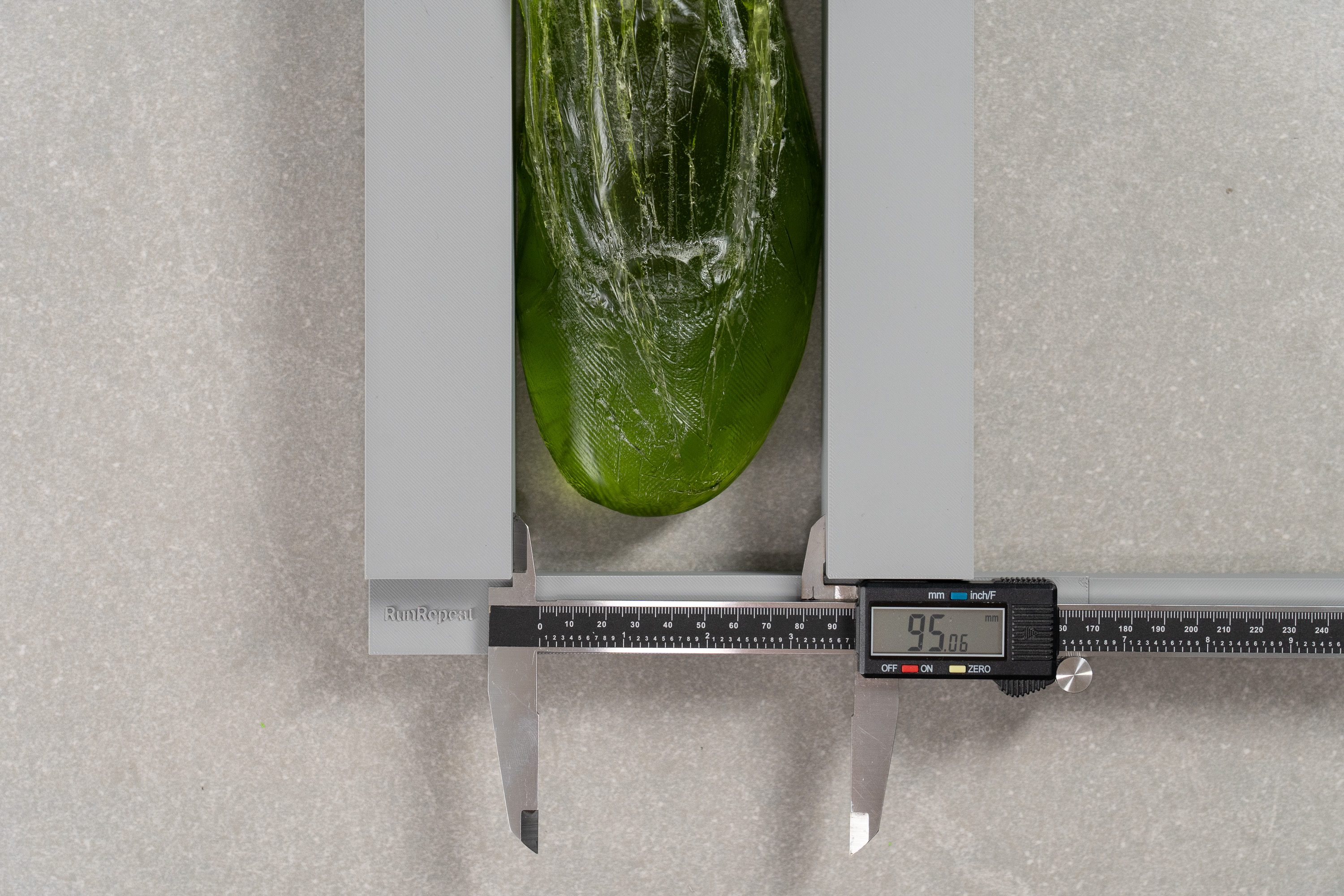
| Downshifter 13 | 95.1 mm |
| Average | 95.1 mm |
Toebox width
The toebox also tapers to an average width of 72.6 mm, which again, might not be ideal for those with wide feet. However, for most runners, this should provide a comfortable fit.
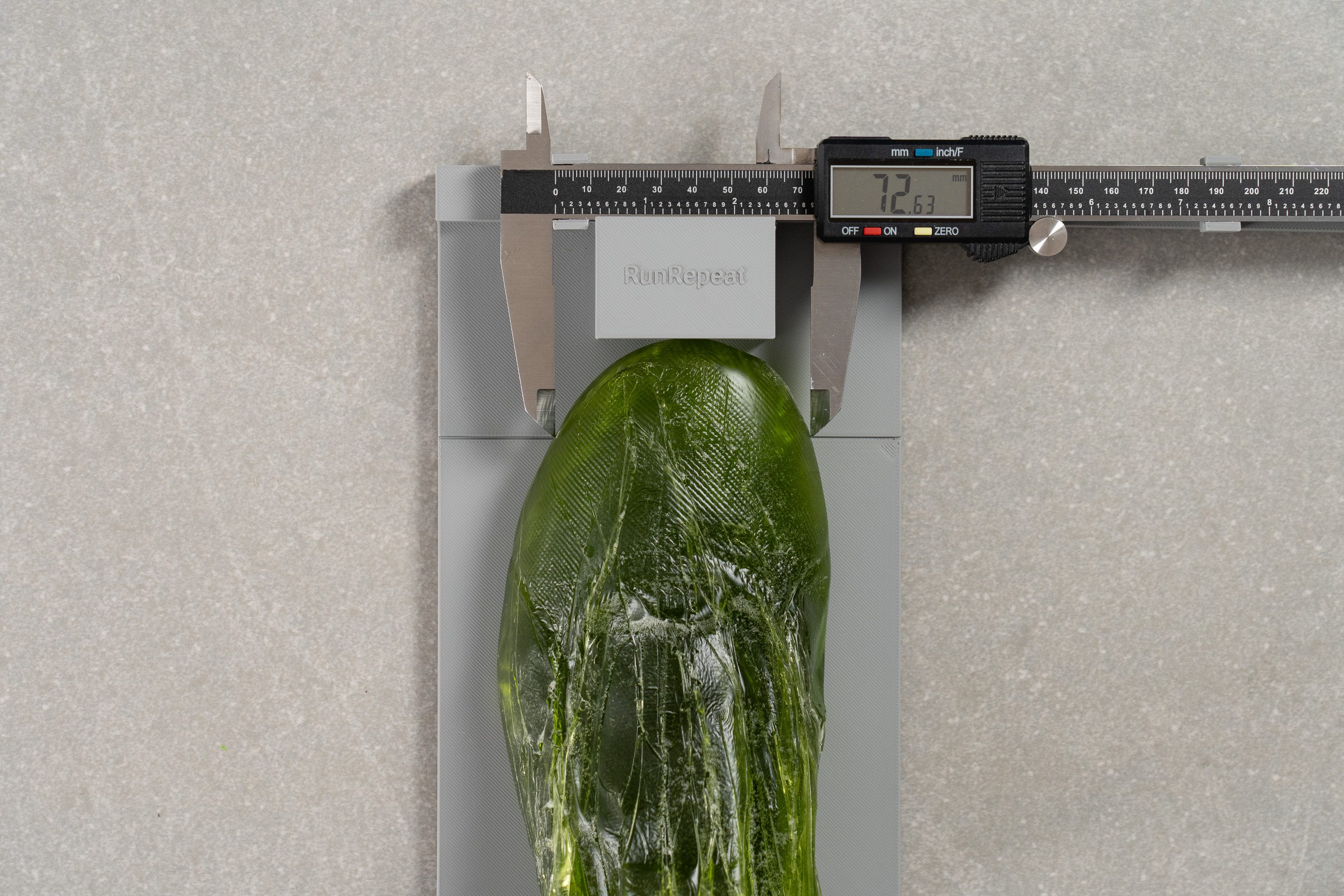
| Downshifter 13 | 72.6 mm |
| Average | 73.3 mm |
Toebox height
We assessed the overall volume of the toebox and found it to be an average 26.9 mm, though it may slightly restrict vertical toe movement for a few runners seeking extra space.
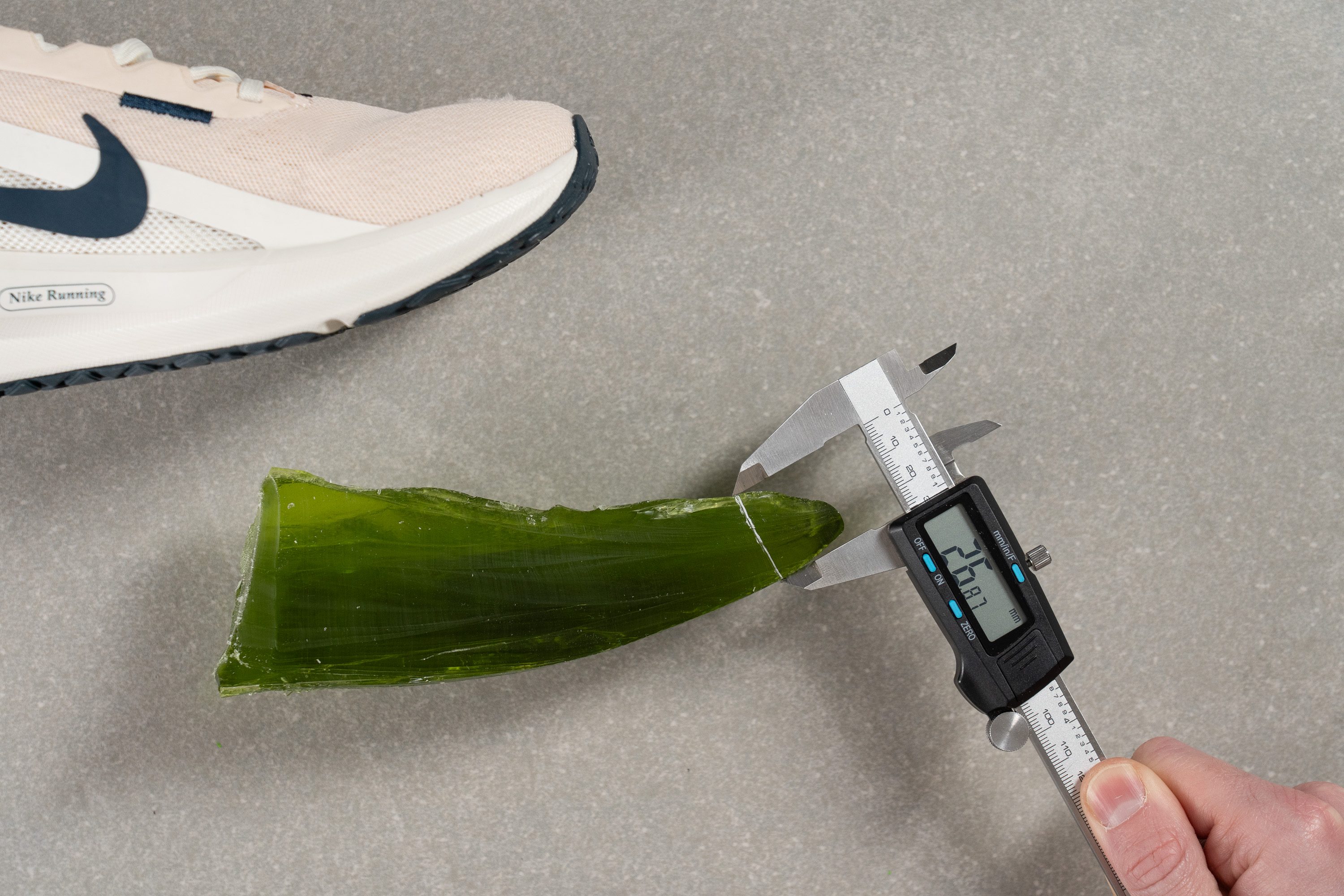
| Downshifter 13 | 26.9 mm |
| Average | 27.0 mm |
Traction / Grip
Traction test
We tested the Downshifter 13 in wet conditions and found a 0.36 score. For a budget-friendly model, that’s a decent result, just don’t expect top-tier traction.
In our experience, grip on dry pavement feels steady for everyday running, but when rain hits or you tackle loose dirt, you’ll probably want something with a more grip-heavy design. Still, for a beginner-friendly shoe, it does the job.
| Downshifter 13 | 0.36 |
| Average | 0.49 |
Outsole design
The Downshifter 13 uses a waffle-patterned outsole that mirrors the Pegasus lineup, offering full-length rubber coverage split by flex grooves and a narrow midfoot channel. Basically, it’s like a Peg but with simpler geometry.
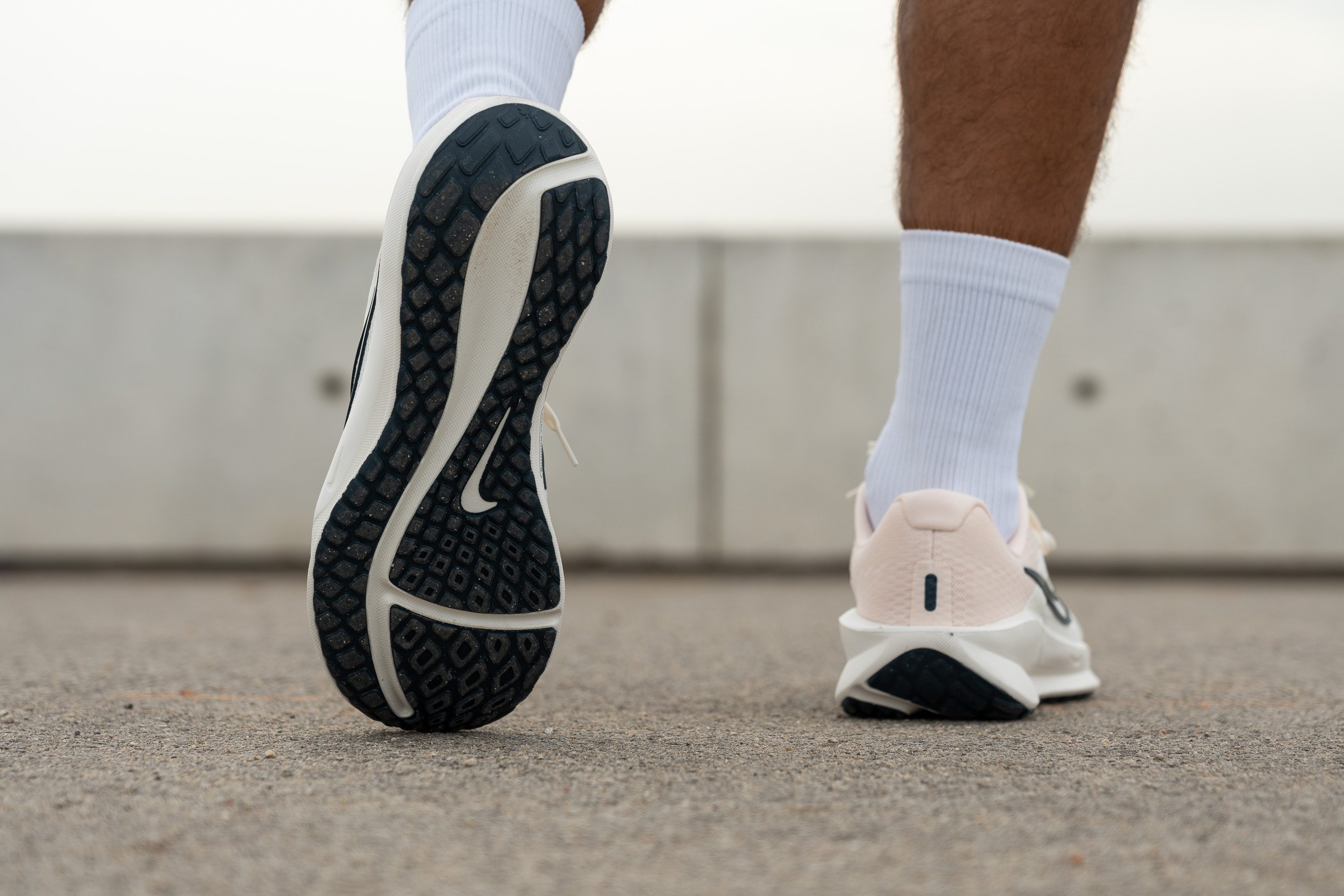
Flexibility / Stiffness
We secured the Downshifter 13 to the table and used a force gauge to precisely measure the force needed to flex the shoe 30 degrees.
At just 11.4N, the Downshifter 13 showcases great flexibility, far surpassing the average running shoe. This enhances comfort for everyday activities such as walking the dog or going to the supermarket.
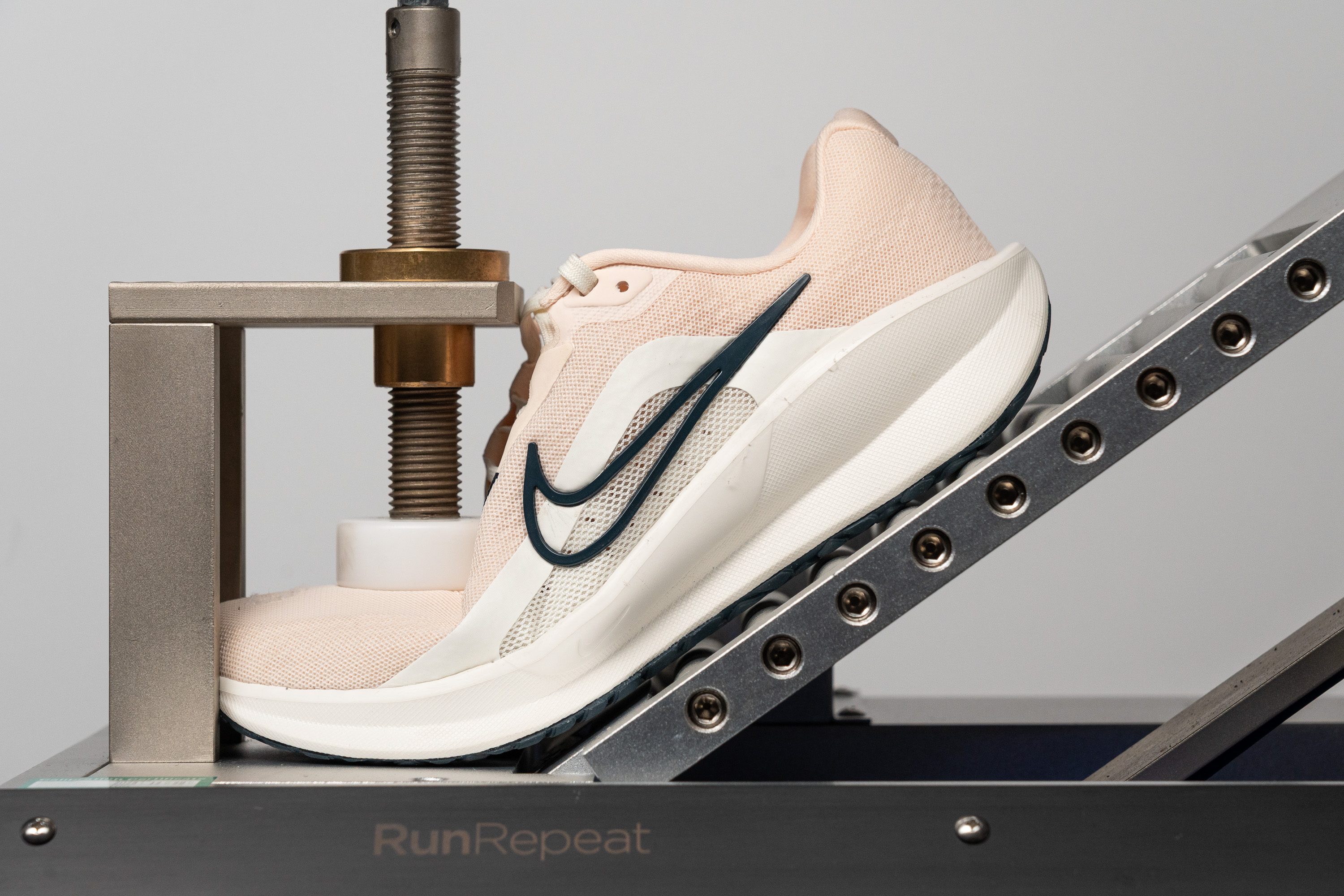
| Downshifter 13 | 11.4N |
| Average | 15.3N |
Weight
The Downshifter 13 tips the scales at just 9.3 oz or 265g, delighting us as it not only stays under the 10-oz mark but is also 0.6 oz lighter than its predecessor.
And impressively, this reduction in weight does not compromise cushioning or comfort.
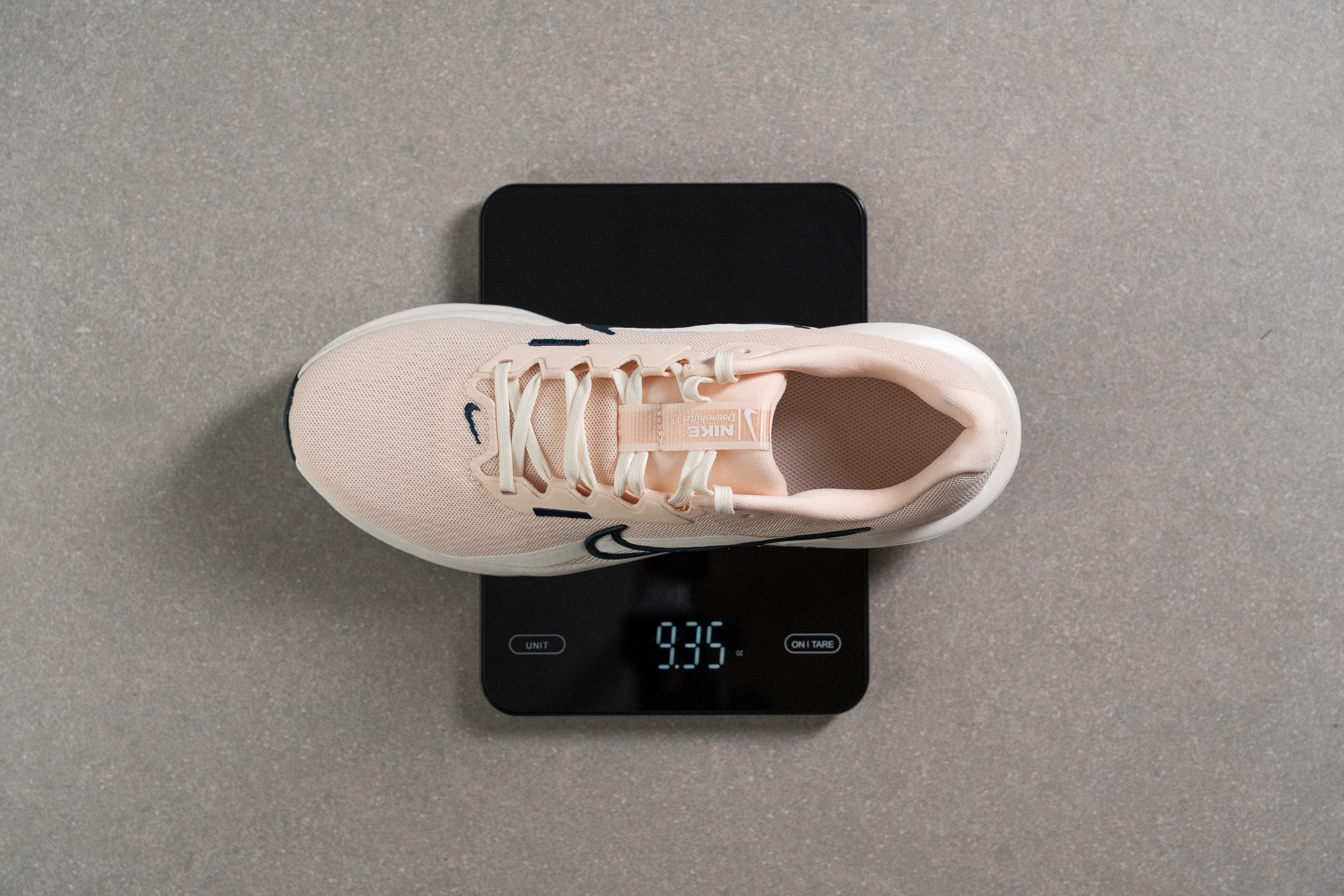
| Downshifter 13 | 9.3 oz (265g) |
| Average | 9.3 oz (264g) |
Breathability
The Downshifter 12 offered only average breathability, and we did not recommend it for hot weather running. However, the 13th version does a great job even on the hottest days, scoring a 4/5 in our ventilation smoke test.
Nike's use of a sandwich mesh upper is a significant improvement—thinner and more effective than last year's model, allowing light to pass through effortlessly.
Upon examining the mesh under a microscope during our initial tests, we discovered that the upper is made from numerous tiny ventilation holes that greatly enhance airflow.
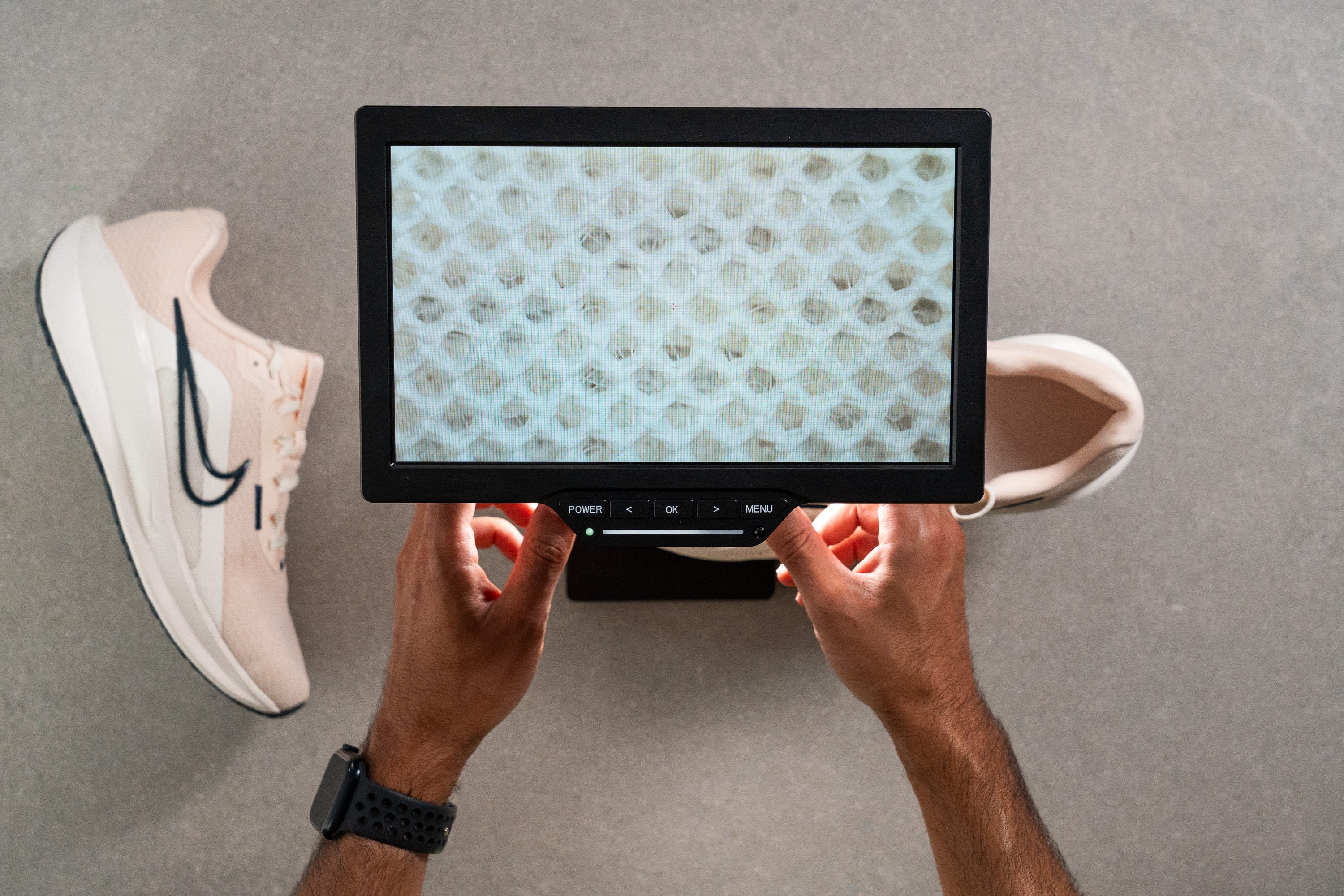
This is indeed impressive quality for a budget-friendly shoe!
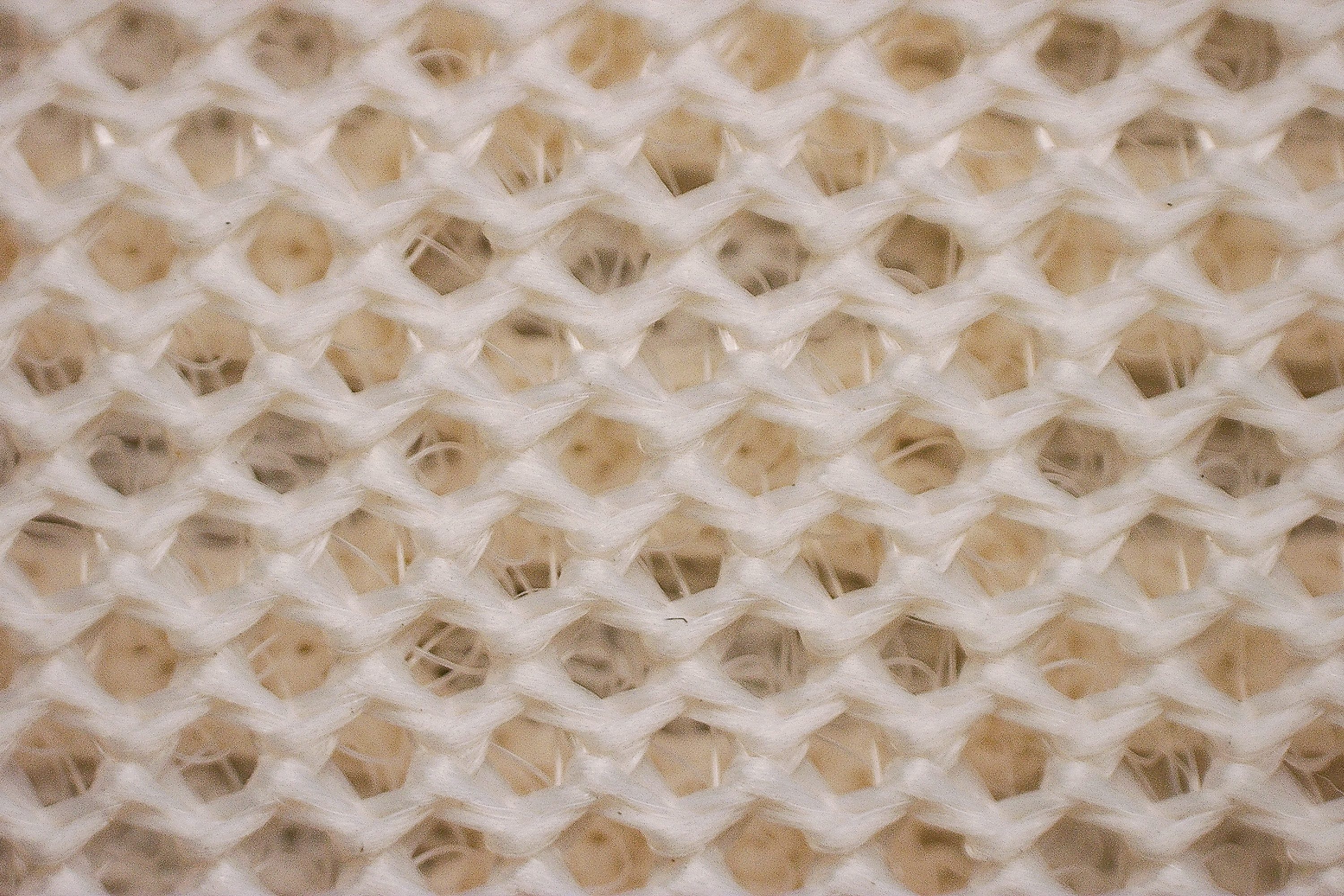
The upper is designed with three distinct sections—the back and tongue are exceptionally plush, the midfoot provides support, and the toebox is exceptionally thin to optimize airflow.
| Downshifter 13 | 4 |
| Average | 3.7 |
Stability
Lateral stability test
The Downshifter 13 from Nike is designed as a neutral daily trainer, not catering to those requiring stability features. However, for runners who don't need additional support, we discover that it offers agility and nimbleness that stand out among many of its competitors.
Torsional rigidity
Nike stuck to the essentials with this shoe, closely adhering to the formula of an "dependable daily trainer." This approach is why, across many of our tests, it consistently scores near the middle, with this 3/5 rating serving as yet another example!
| Downshifter 13 | 3 |
| Average | 3.5 |
Heel counter stiffness
The heel counter in this shoe is also universally designed, earning it a rating of 3/5 from our tests. It's gentle enough not to irritate sensitive Achilles tendons, yet it doesn't provide the robust support of a very rigid counter.
| Downshifter 13 | 3 |
| Average | 2.9 |
Midsole width - forefoot
Believe it or not, the midsole dimensions are also—average! Nike claims that this shoe is built on the same last as the popular Pegasus 41, so we expected it to be a bit wider than its actual width of 111.9 mm.
However, our measurements revealed that the sole flare isn't as pronounced, resulting in this model being 3.6 mm narrower than anticipated, yet it uses the same last and delivers a Peg-like fit.
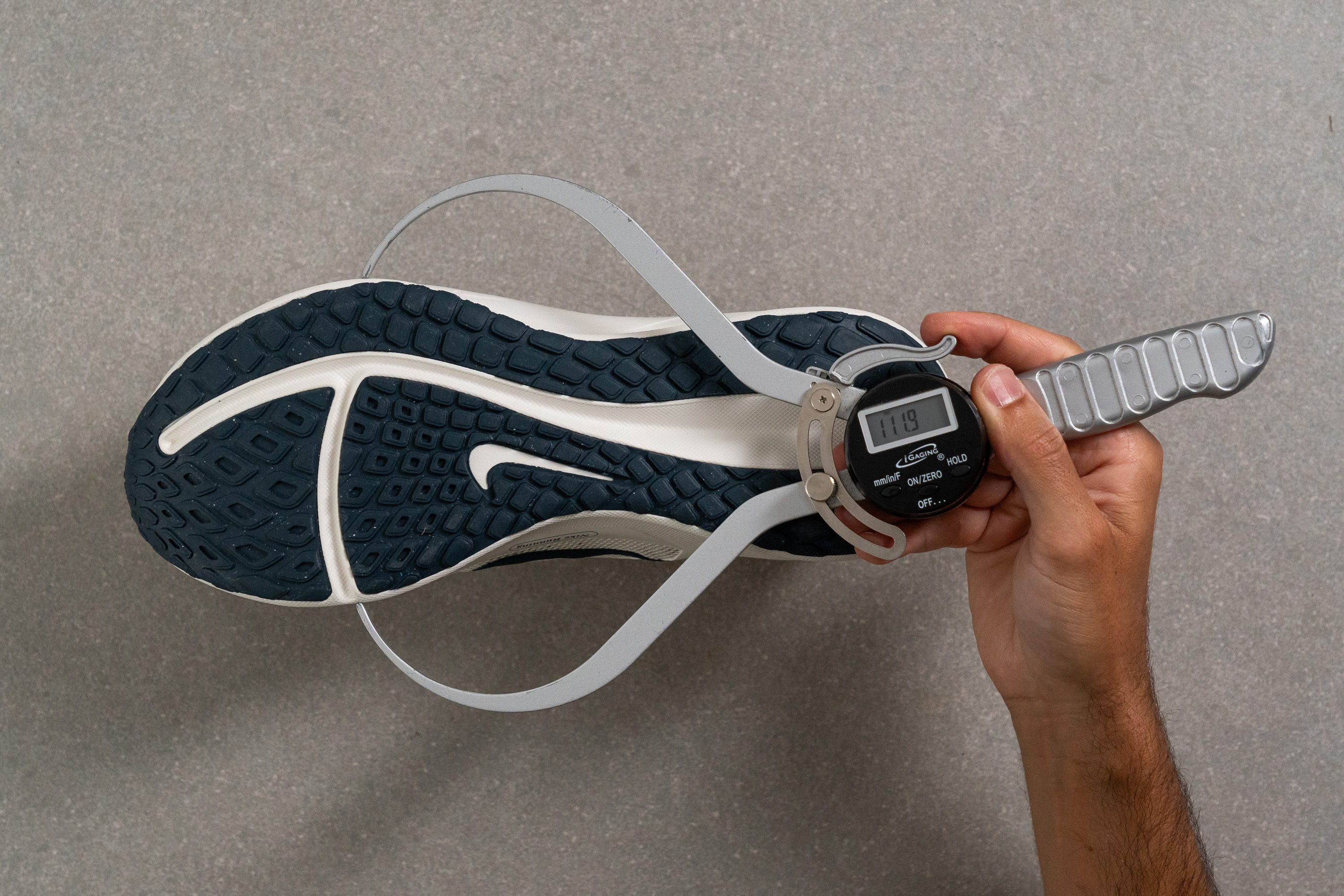
| Downshifter 13 | 111.9 mm |
| Average | 114.4 mm |
Midsole width - heel
Our digital caliper measurements indicate a heel width of 88.5 mm, similar to our lab's average after testing many hundreds of shoes. This width gives heel strikers a sufficient platform for stable landings while preserving the shoe's nimble feel underfoot.
For extreme heel strikers in search of a broader landing area in a neutral shoe, we recommend the ASICS Jolt 4. This budget-friendly option offers a wider 92.8 mm heel platform.
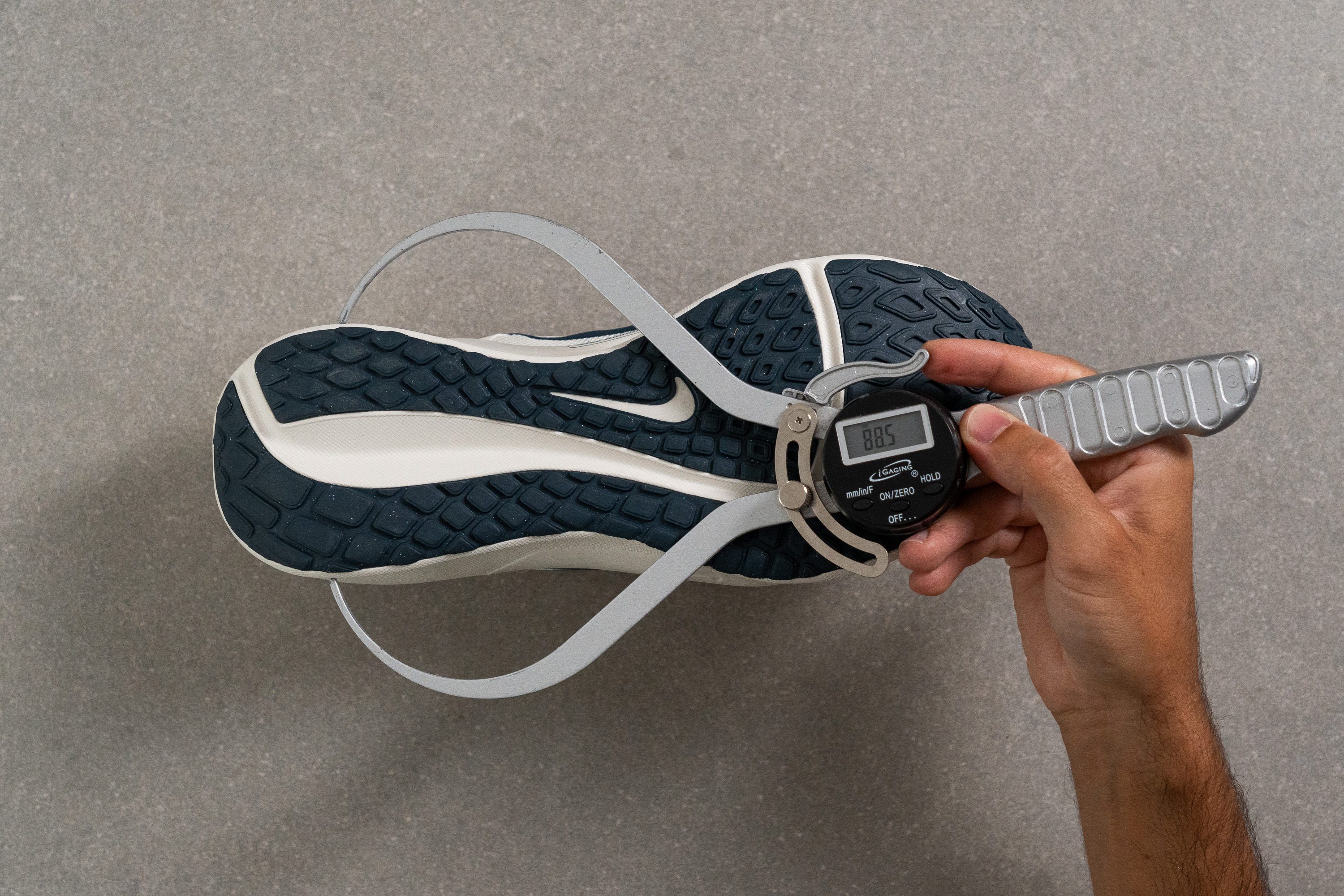
| Downshifter 13 | 88.5 mm |
| Average | 90.6 mm |
Durability
Toebox durability
One of the standout benefits of using a sandwich mesh upper, as opposed to a single-layered one, is its enhanced durability.
Our lab tests confirmed this advantage—we observed a 3/5 durability rating after subjecting the mesh to our Dremel tool. While the top layer sustained damage, the bottom layer held up well, validating Nike's design strategy.
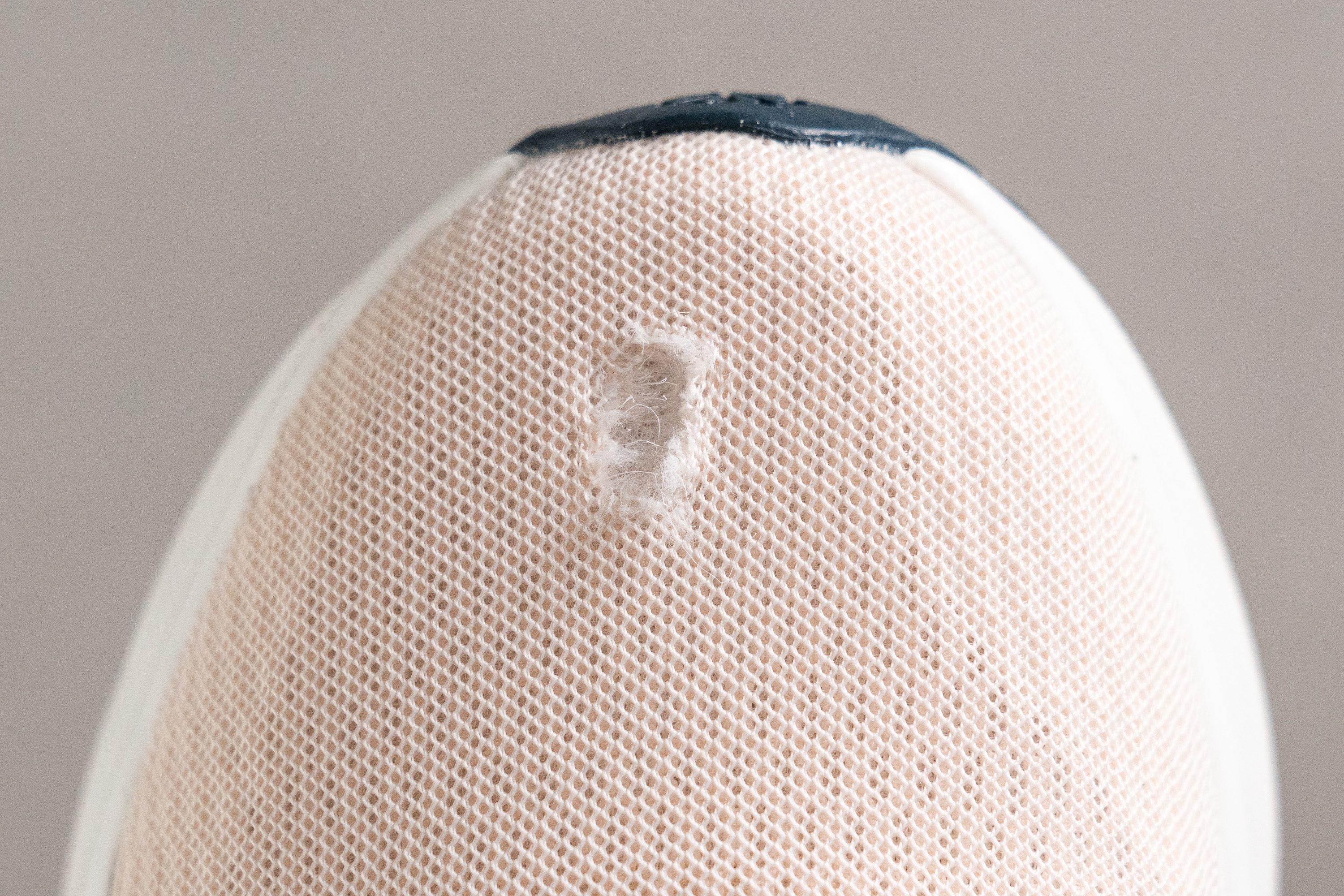
| Downshifter 13 | 3 |
| Average | 2.6 |
Heel padding durability
The heel padding in the Downshifter 13 not only delivers outstanding comfort but also boasts impressive durability—a crucial factor for our endorsement.
Fortunately, our tests revealed a robust 4/5 durability rating, which surpasses even many higher-priced shoes on the market. In fact, this result confirms that Nike has combined this time comfort with lasting performance.
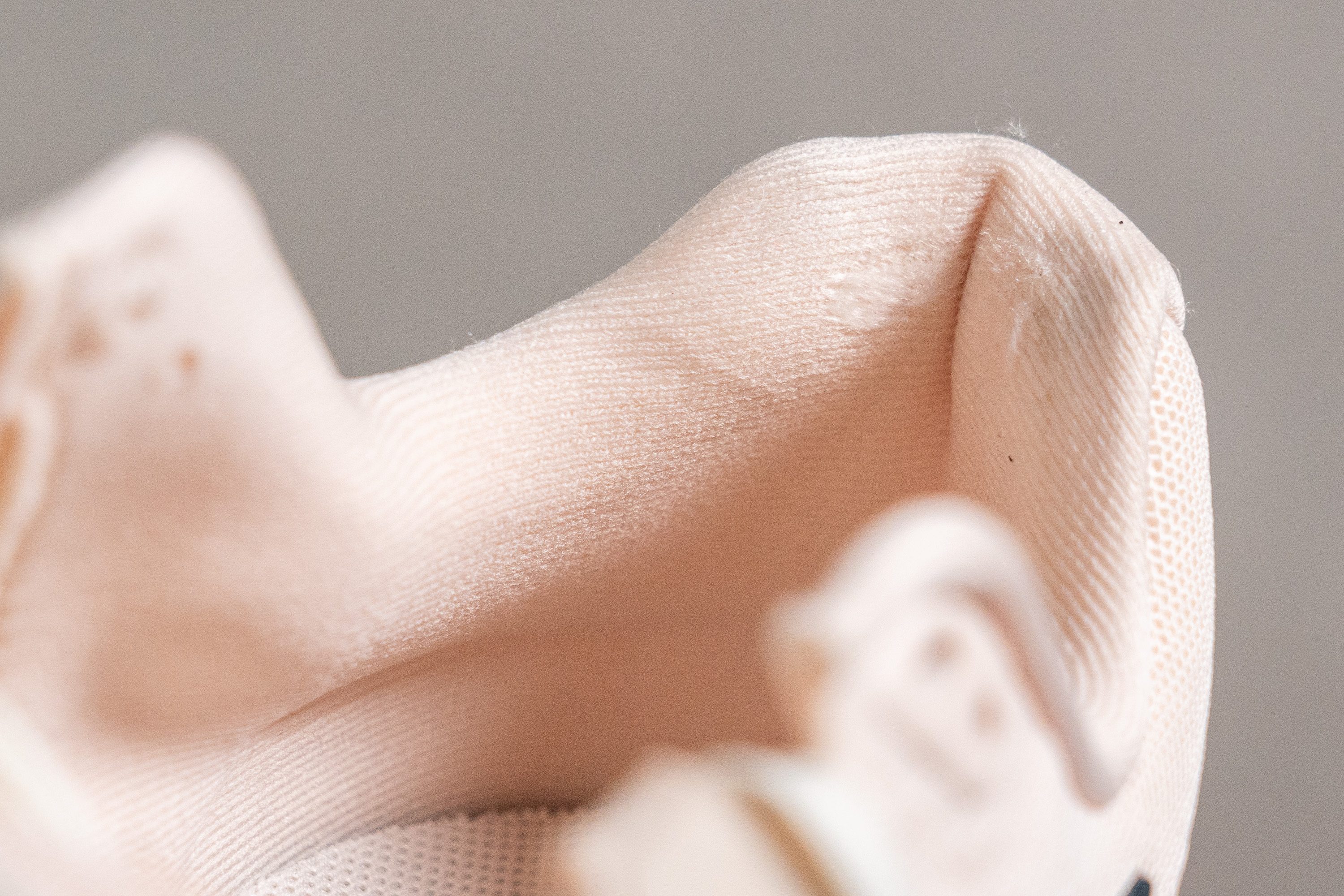
| Downshifter 13 | 4 |
| Average | 3.4 |
Outsole durability
Here in the lab, we cranked up the Dremel to double its usual speed for our third test.
The result? A modest 0.8 mm dent was all that was left behind, indicating a level of durability that, while not extraordinary, should offer good protection for every runner.
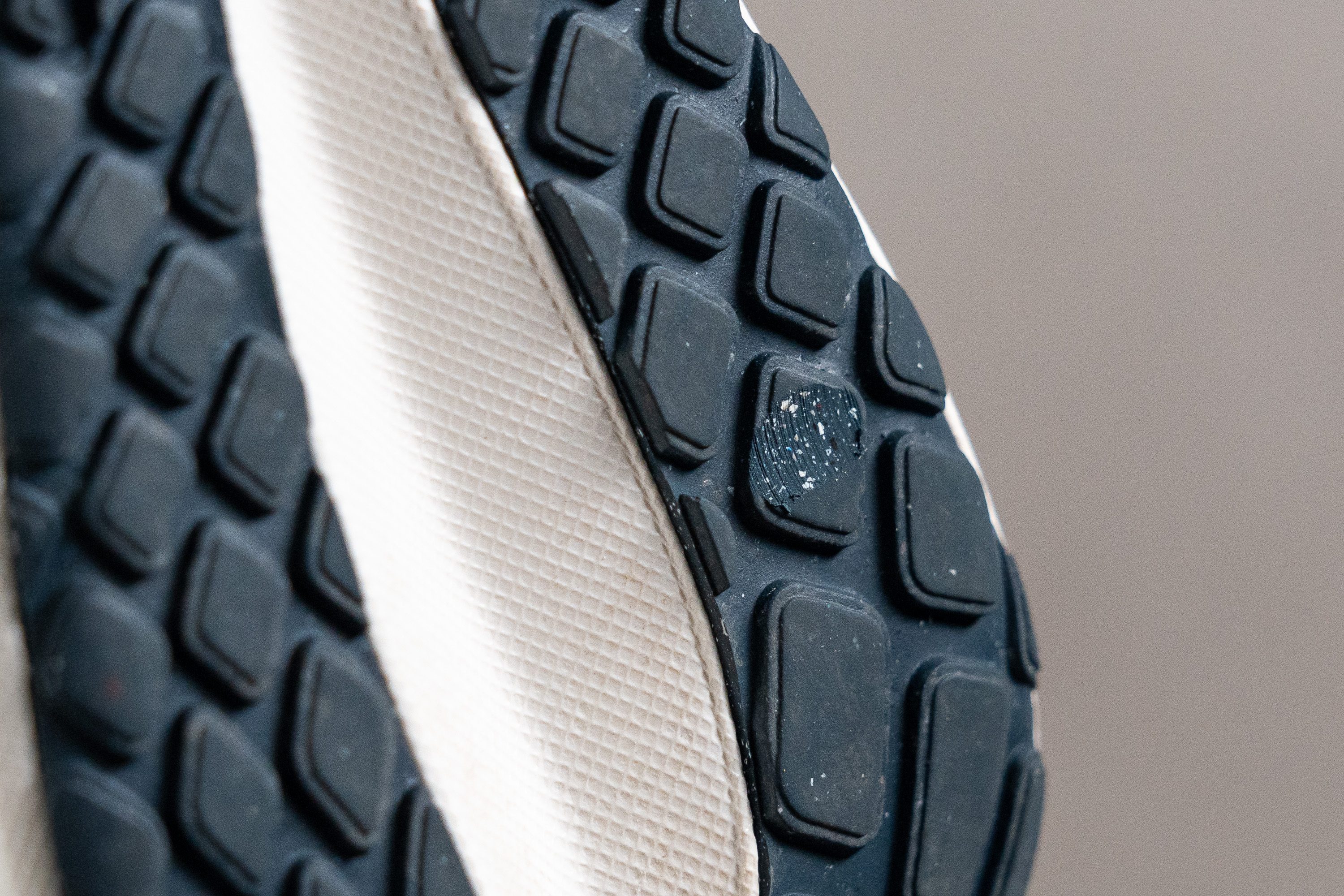
| Downshifter 13 | 0.8 mm |
| Average | 1.1 mm |
Outsole thickness
Ultimately, we assessed the outsole's thickness and discovered a well-balanced 3.1 mm.
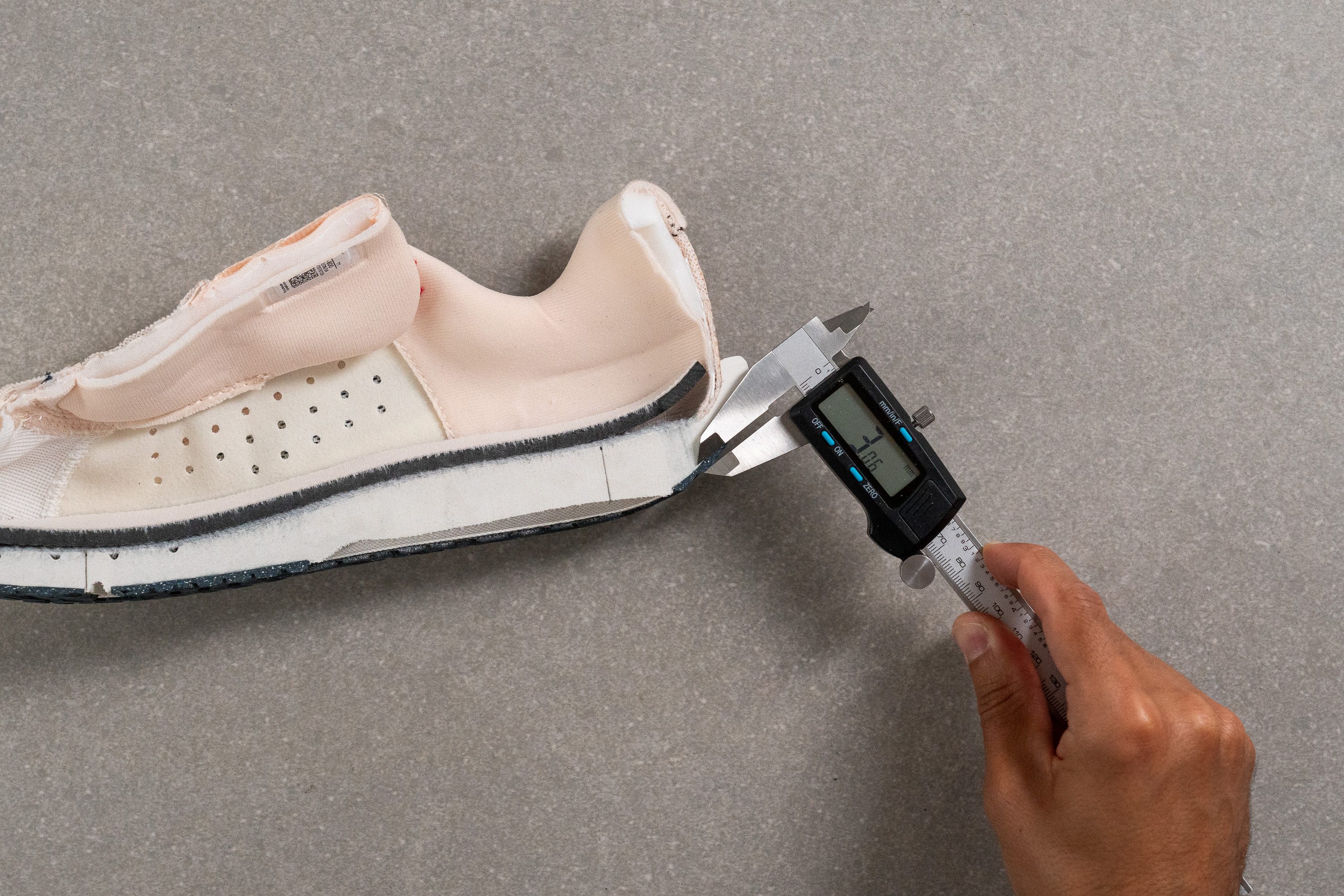
| Downshifter 13 | 3.1 mm |
| Average | 3.2 mm |
Misc
Insole thickness
We measured the EVA insole of the Downshifter 13 at just 4.8 mm, a thickness typical for most running shoes.
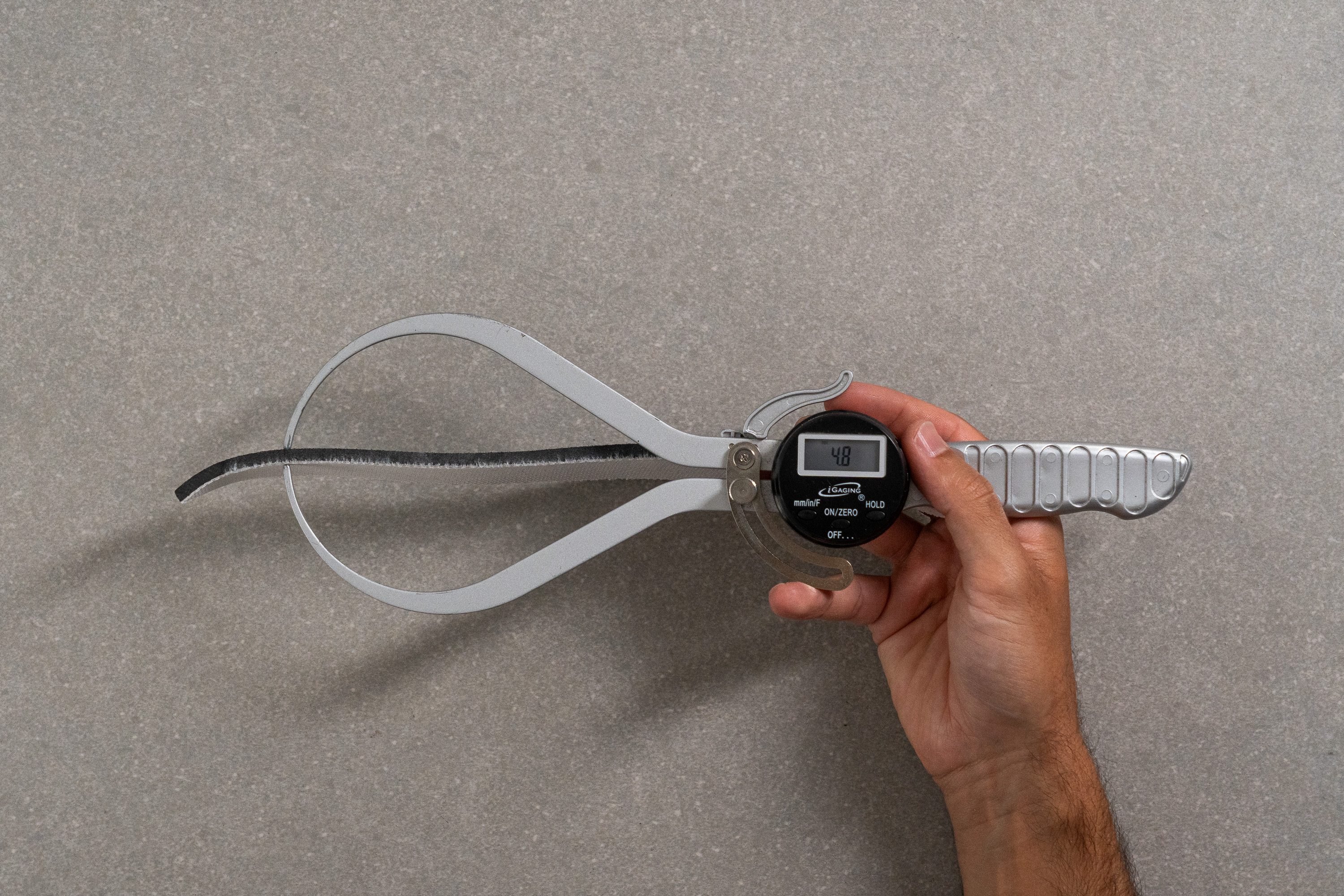
| Downshifter 13 | 4.8 mm |
| Average | 4.5 mm |
Removable insole
The insole is removable, allowing you to replace it with one that better suits your preferences. This is an important feature, especially since we've discovered that the original insole is among the lowest quality we've encountered in any running shoe.
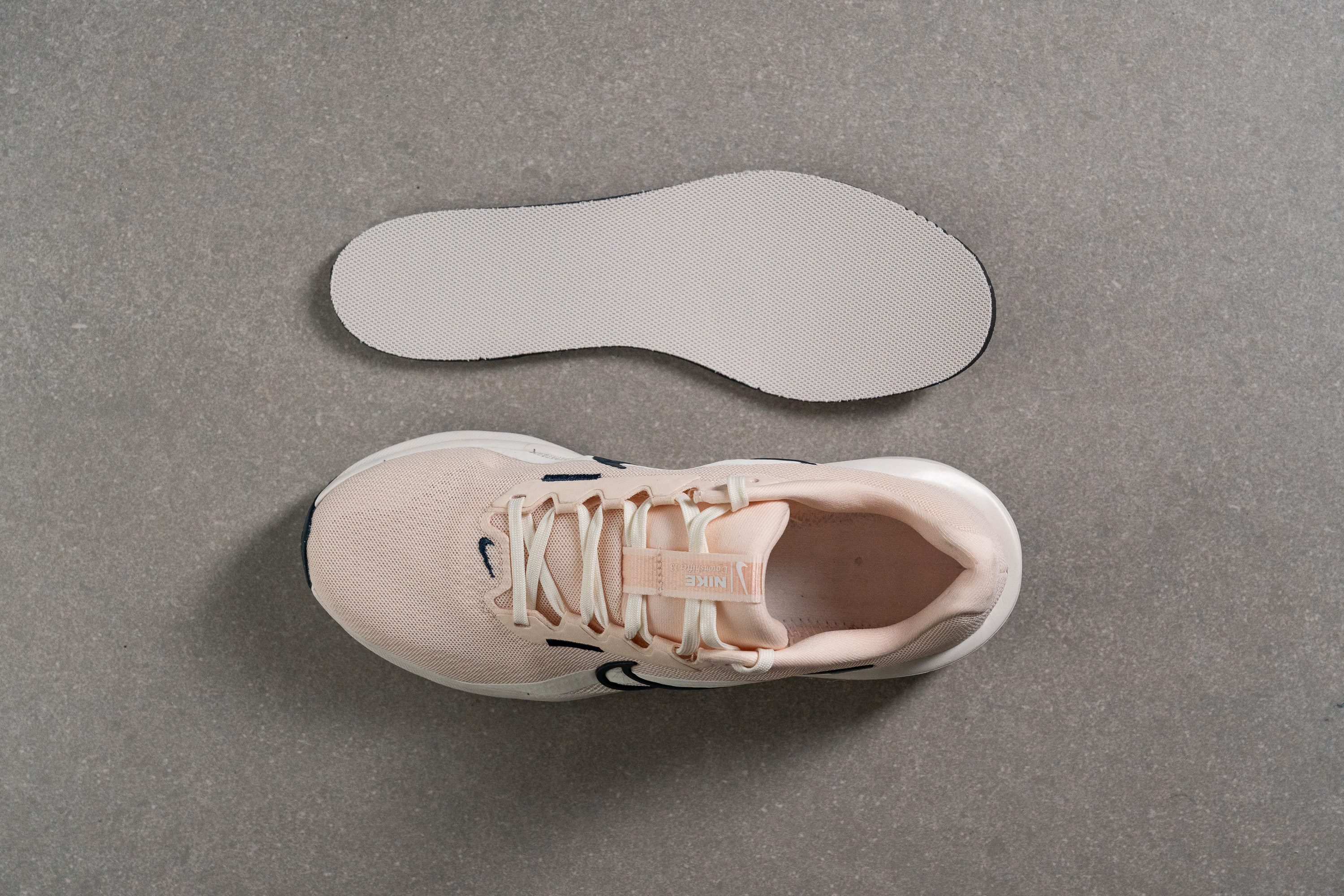
| Downshifter 13 | Yes |
Midsole softness in cold (%)
We subjected the Downshifter 13 to a 20-minute freeze test and measured again its softness using a Shore A durometer. Remarkably, the midsole demonstrated just a 22.4% uptick, an impressive performance for an EVA-based midsole.
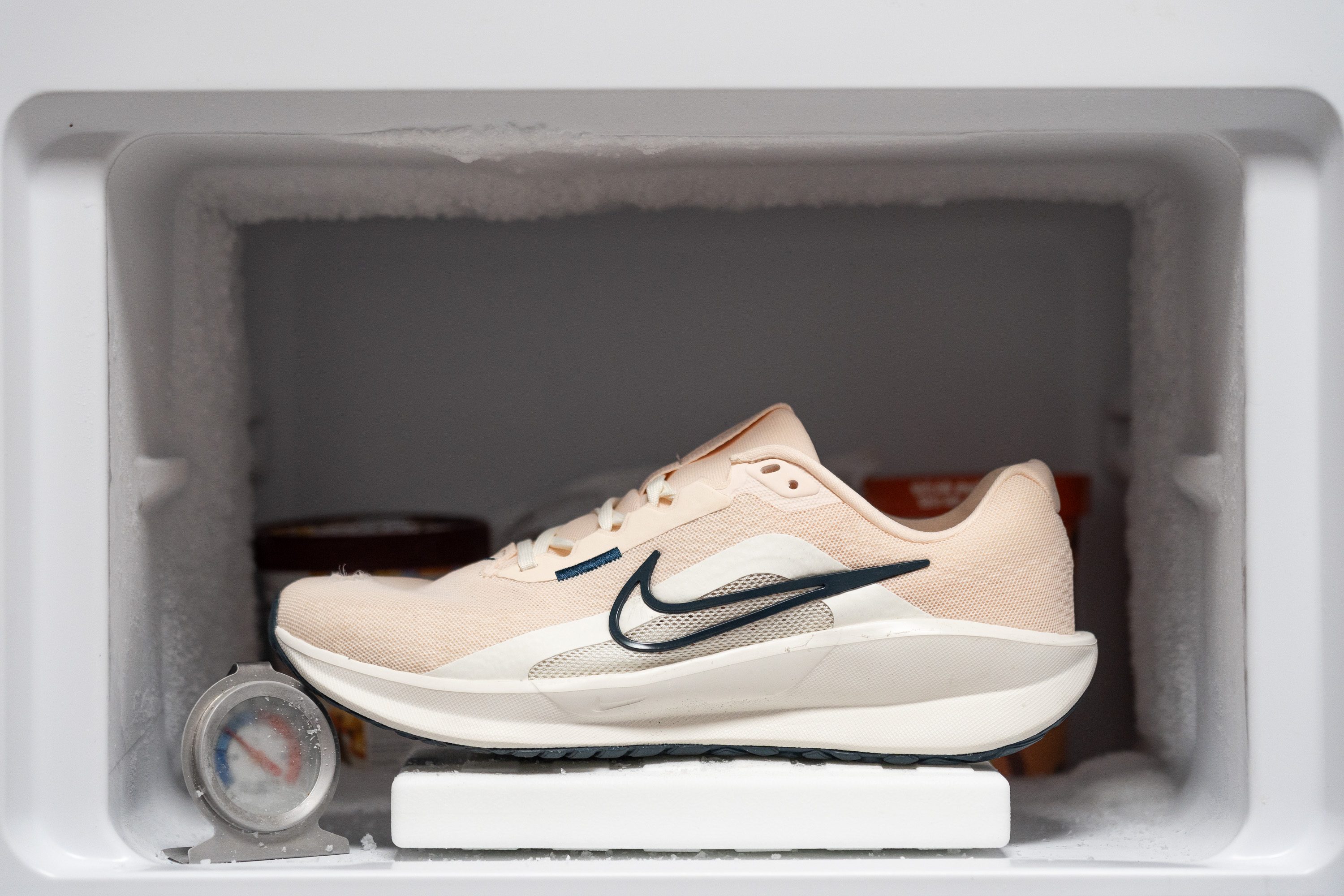
| Downshifter 13 | 22% |
| Average | 24% |
Reflective elements
The Downshifter 13 lacks reflective elements on its entire upper.
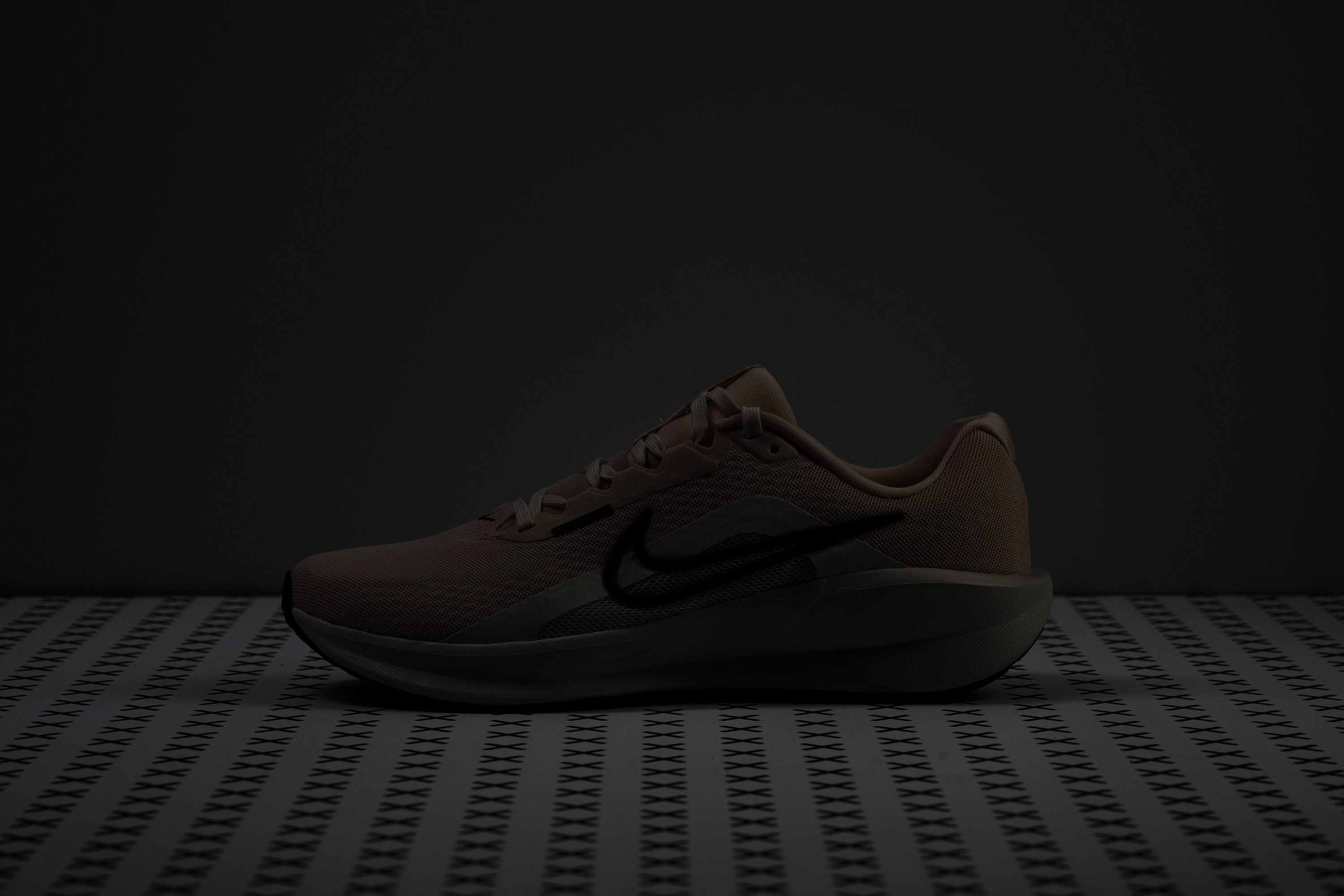
| Downshifter 13 | No |
Tongue padding
The tongue offers unmatched comfort at a surprisingly affordable price. We discovered it features 10.8 mm of padding, crafted from three layers of foam.
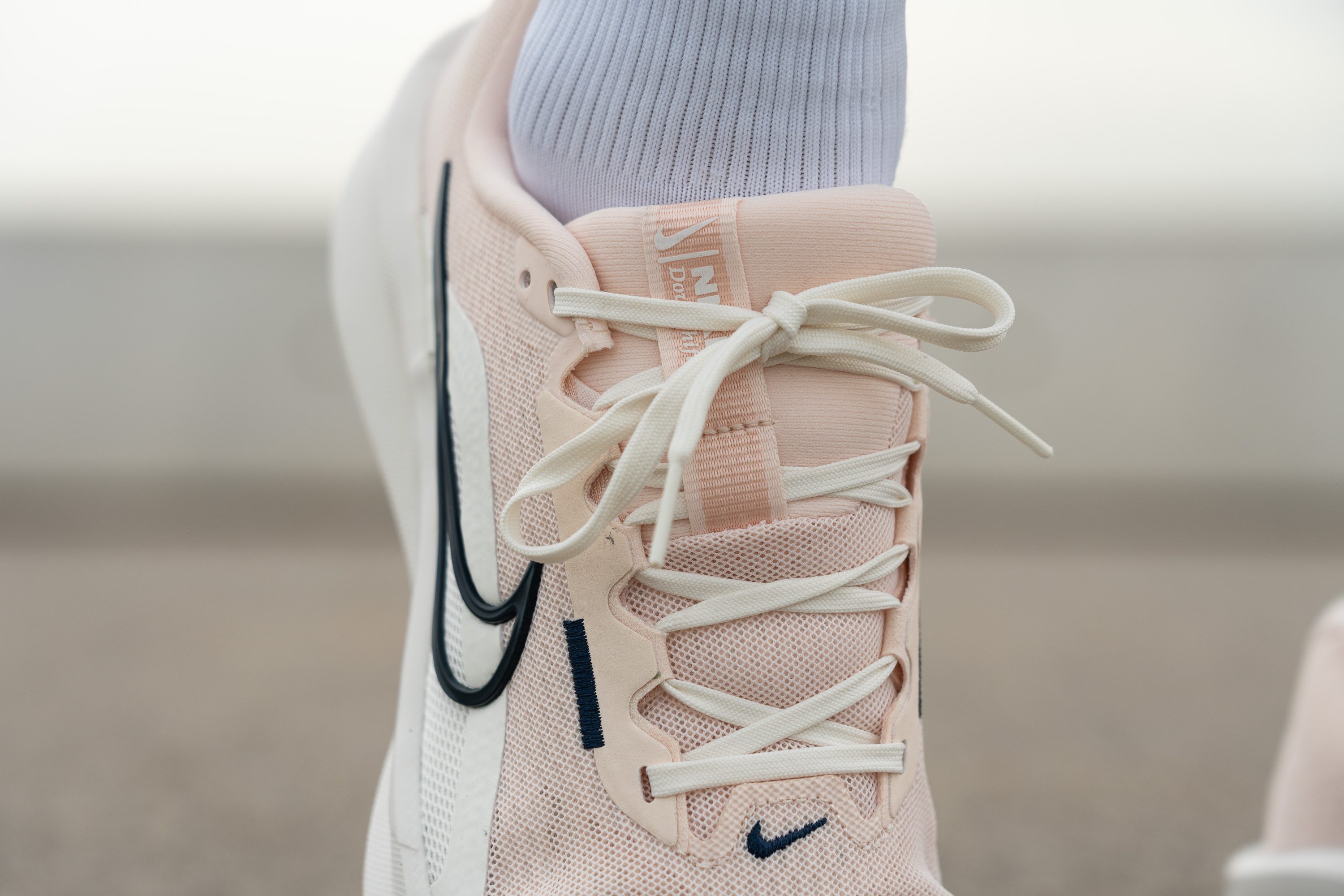
We think Nike could potentially reduce the padding to 6-7 mm to achieve similar comfort with less weight. Nevertheless, we're certainly not complaining about such a plush tongue!
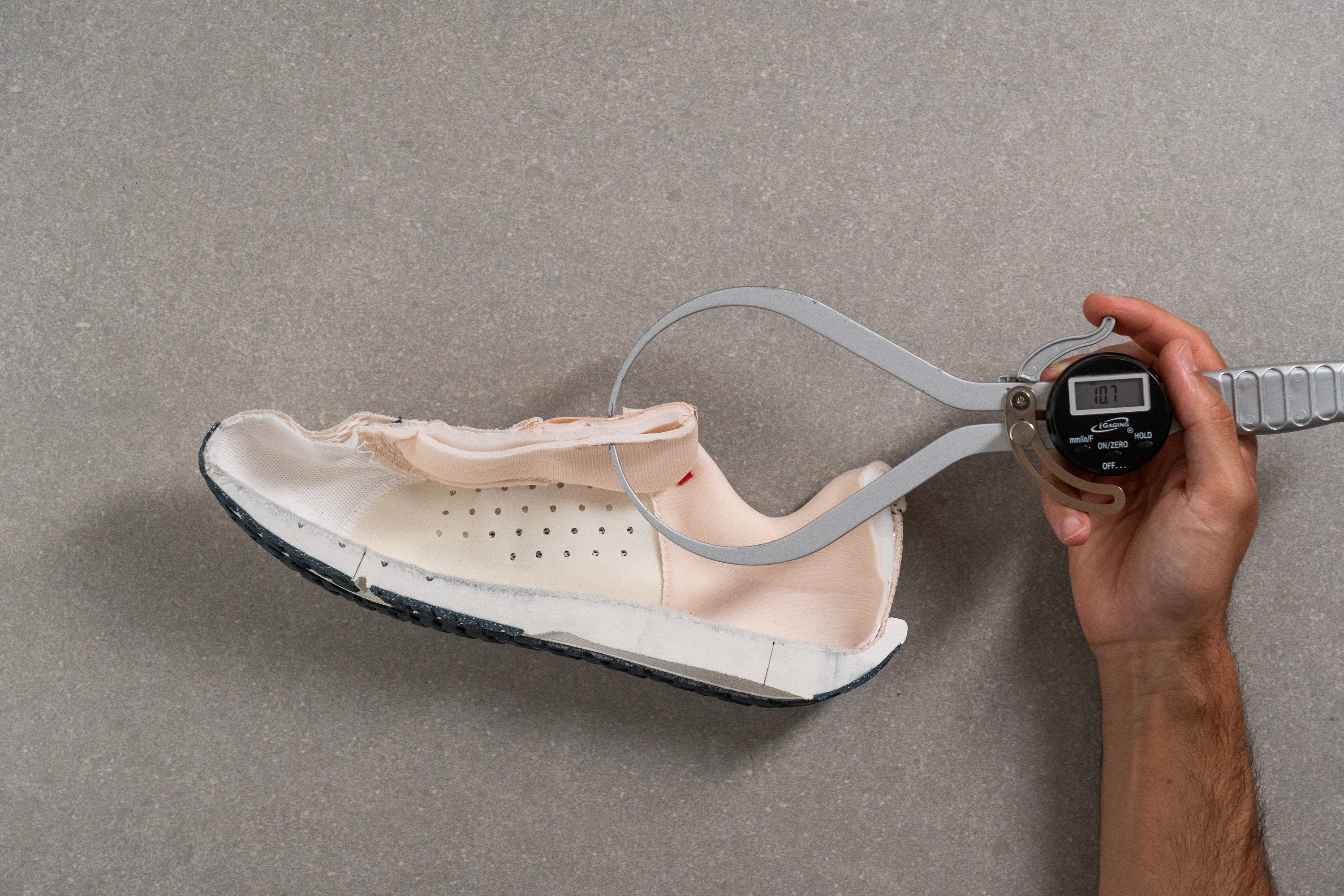
| Downshifter 13 | 10.8 mm |
| Average | 5.7 mm |
Tongue: gusset type
Given the shoe's modest MSRP of $75, it wasn't surprising for us to find that Nike opted for a non-gusseted tongue. This feature is typically considered premium, more common in shoes that cost twice as much.
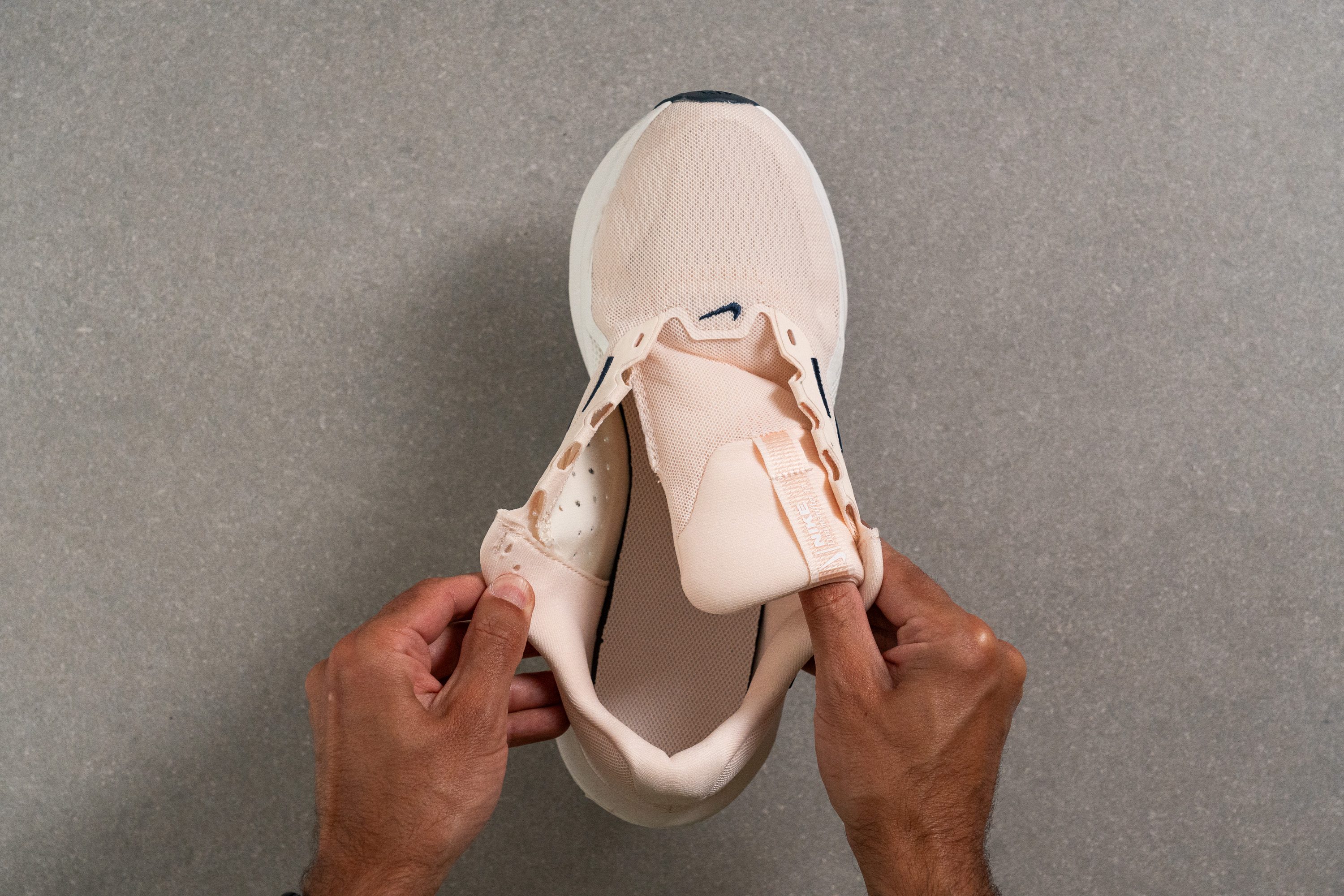
| Downshifter 13 | None |
Heel tab
Nike occasionally excludes heel tabs on their road running shoes, as it happens with the Downshifter 13. However, at a price of $75, we're okay with that.
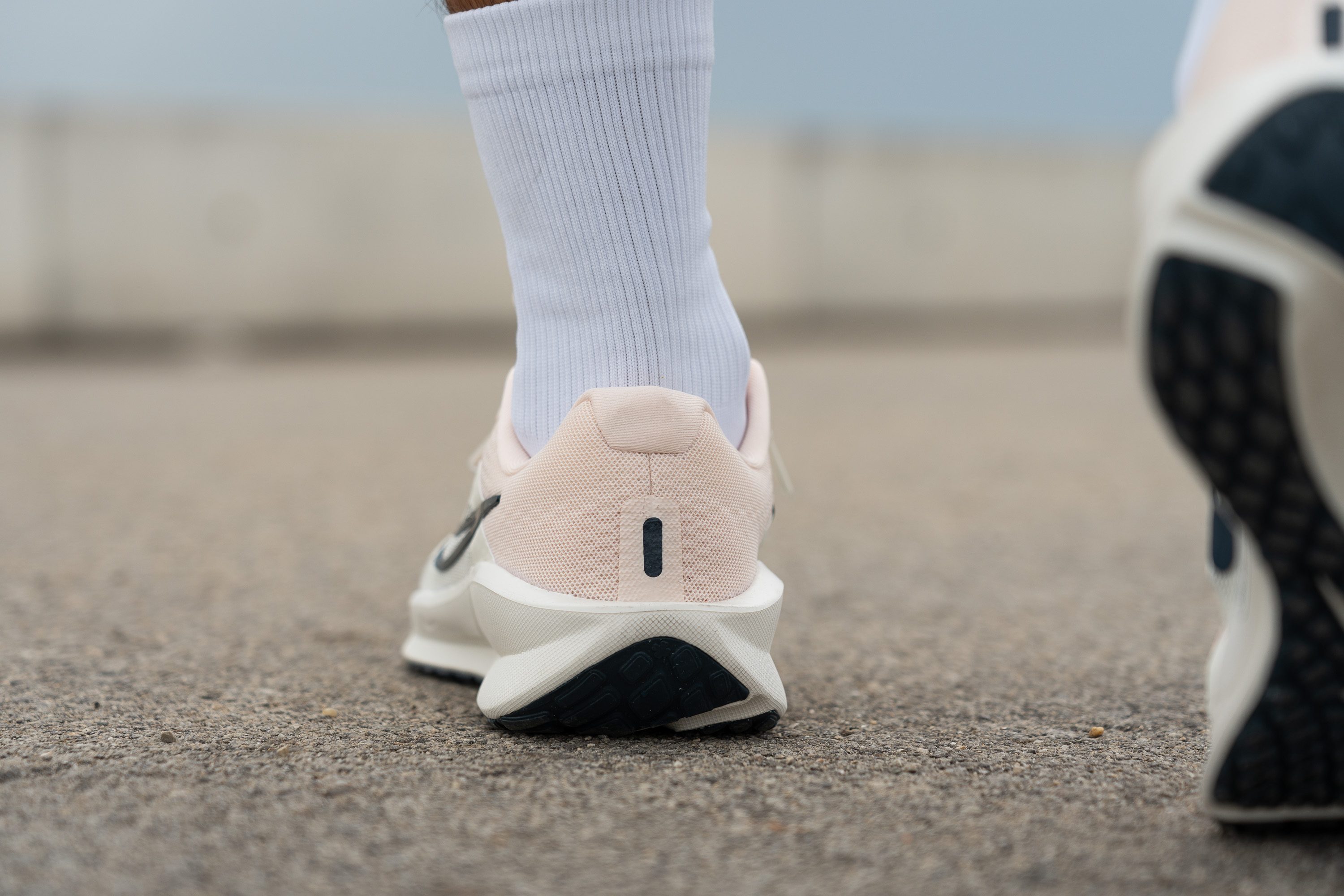
| Downshifter 13 | None |

